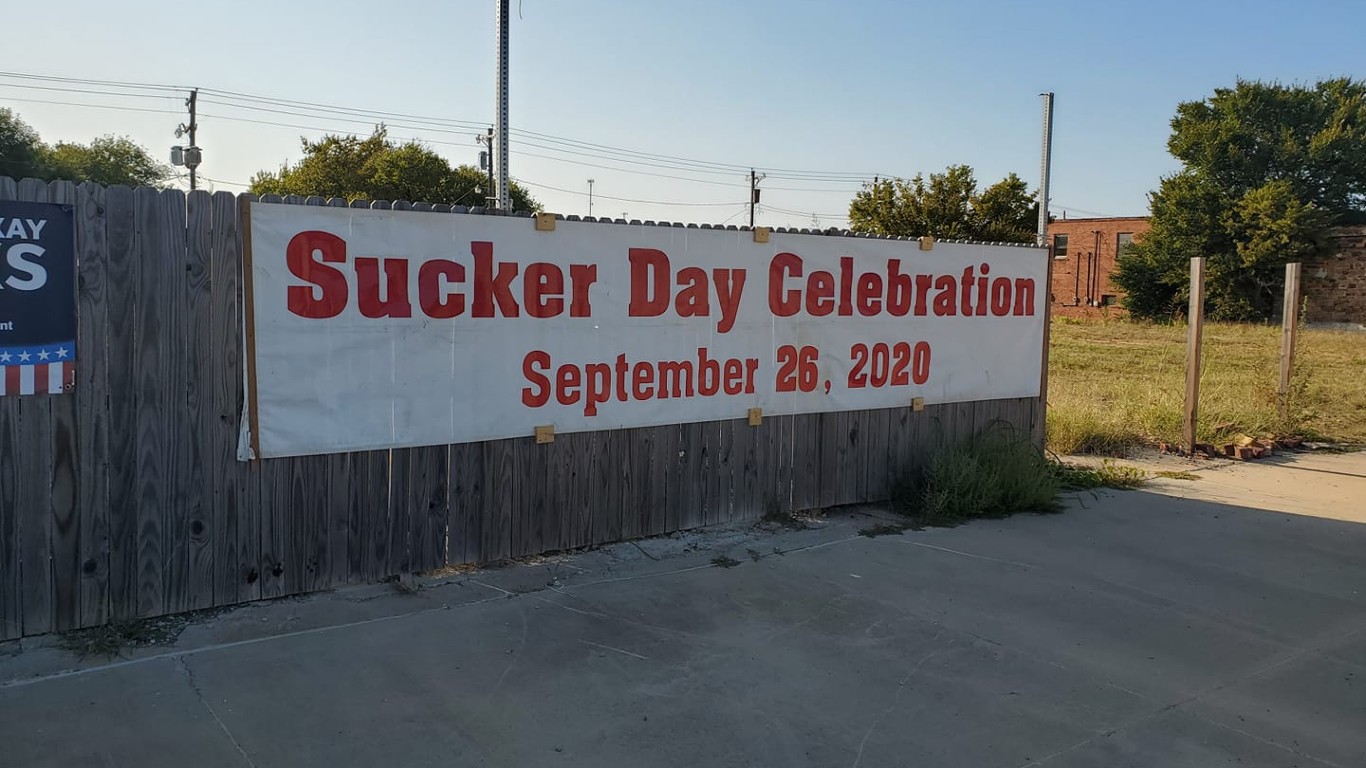
Each U.S. state has its own history — a history that helped create and mold the state’s culture. Whether because of past events or influential people, each state also has traditions particular to that state.
Because they are so singular, these traditions may seem quirky, even peculiar, to outsiders. Regardless, states hold fast to these customs, even if they might seem odd — especially if there is a profit to be made.
24/7 Tempo decided to take a look at these unique traditions by tracking down the weirdest in each state.
Traditions are not the only part of history every state has and is proud of — here is the best thing about every state.
Click here to see the weirdest tradition in each state
Some of the traditions on our list revolve around holidays such as New Year’s Eve and Independence Day. Many towns in these states have put their own spin on these traditional celebrations.
Not surprisingly, some of these offbeat traditions involve food. West Virginia hosts a cook-off for roadkill. In Minnesota, folks hold a meat raffle.
Some of these traditions include races in which fish, as opposed to horses or dogs, compete against each other. In Maryland, visitors can root for their favorite crustacean in the National Hard Crab Derby.
Though some places may balk at characterizing a particular custom as weird, many cities enjoy their offbeat description. For example, the cities of Portland, Oregon; Asheville, North Carolina; and Austin, Texas, have used the slogan of keeping their city weird on public buildings, signs, and bumper stickers as a way to boost tourism — these are the strangest roadside attractions in every state.
24/7 Tempo reviewed media sources, state and city websites, and cultural resources to compile a list of famous and weird traditions in each state. We looked at each tradition to assess its uniqueness in regard to the state as well as how unusual the tradition or custom is. Obviously, the peculiarity of a tradition is in the eye of the beholder. What is weird to one person may not be to another.
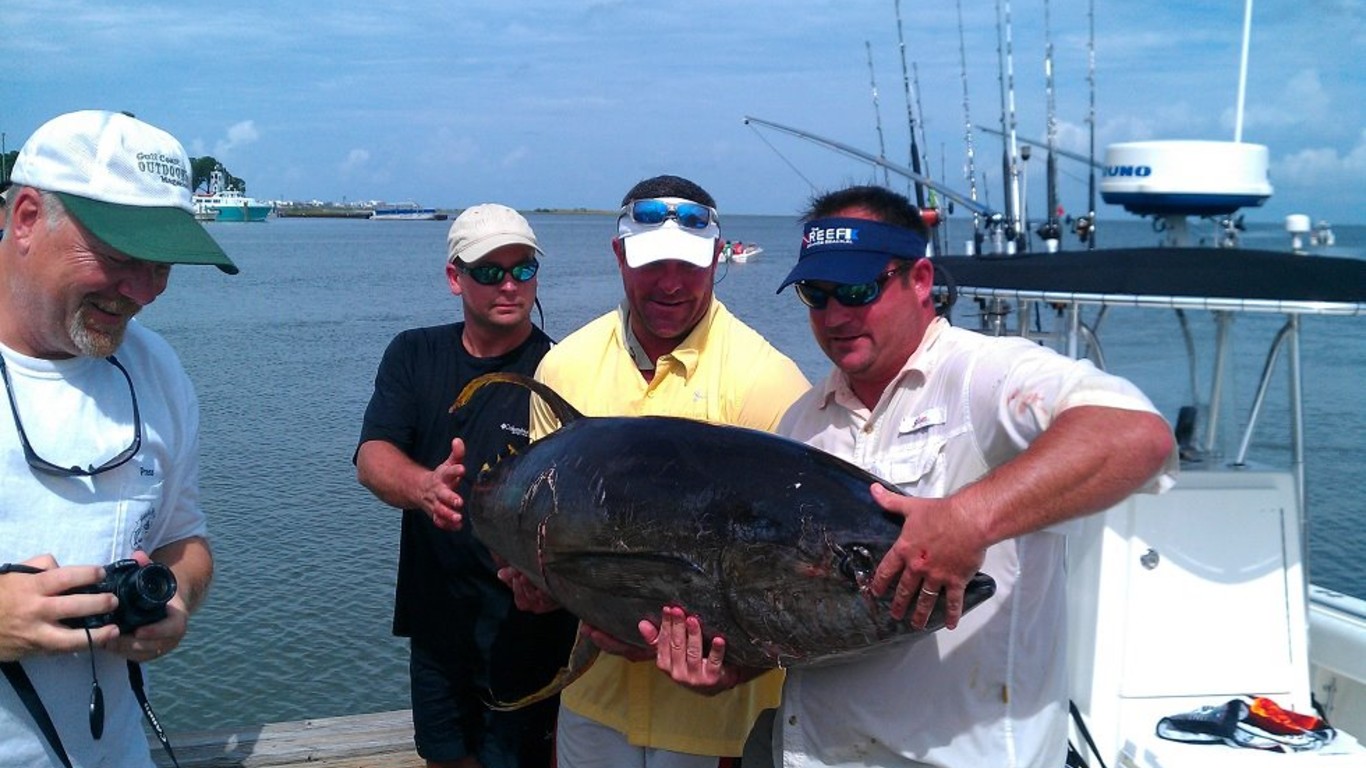
1. Alabama
> Tradition: Deep Sea Fishing Rodeo
> When: Every Summer
Alabama’s 3-day Deep Sea Fishing Rodeo, which takes place on Dauphin Island, is the world’s largest fishing tournament. It was first held in 1929 and has grown to include more than 3,000 anglers who compete for a range of fish-wrangling and cash prizes and 75,000 spectators.
[in-text-ad]
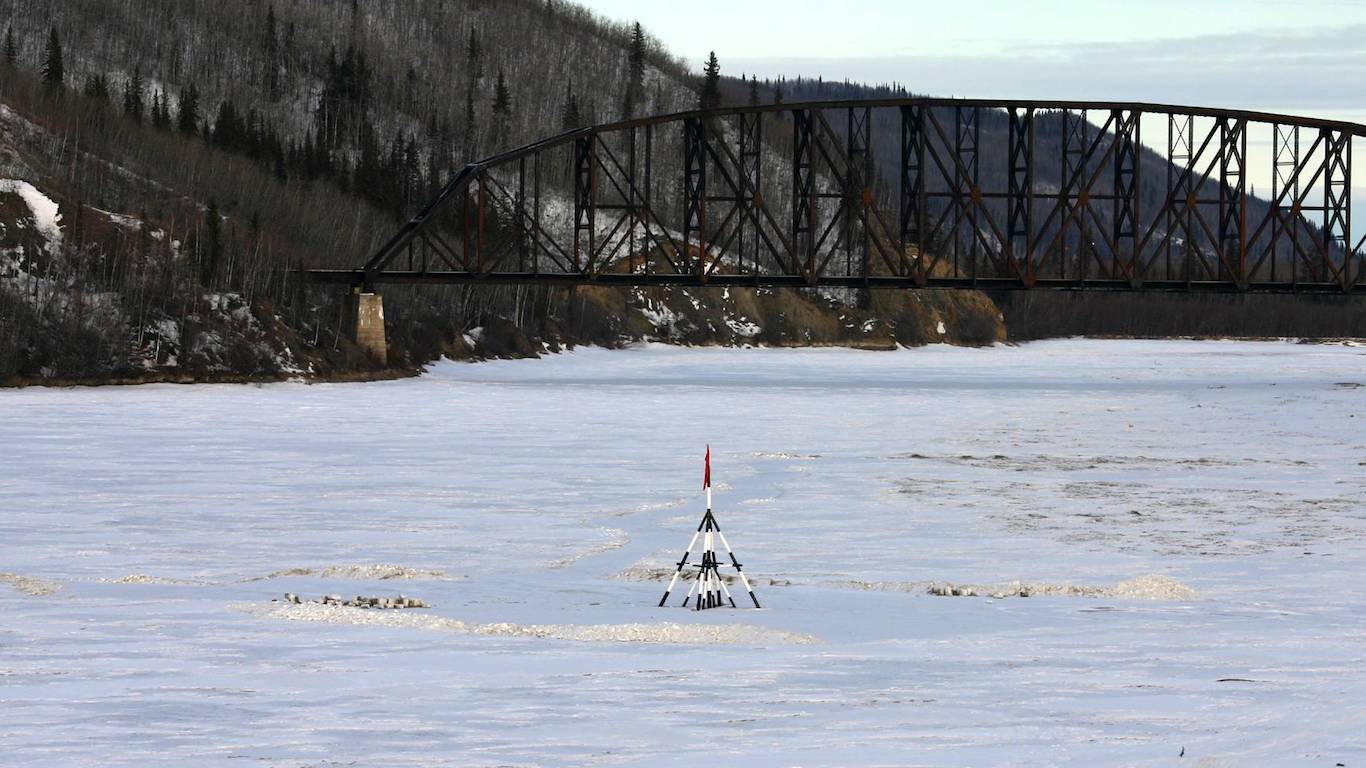
2. Alaska
> Tradition: Nenana Ice Classic
> When: Late winter, early spring
The Nenana Ice Classic, which has been held since 1917, is a contest in which people bet when the ice on the Tanana River will break up each spring. The river is adjacent to the town of Nenana. A tripod is placed on the ice and is connected to a clock. When the ice starts to break, the tripod moves, causing the clock to stop, and that decides the winner.
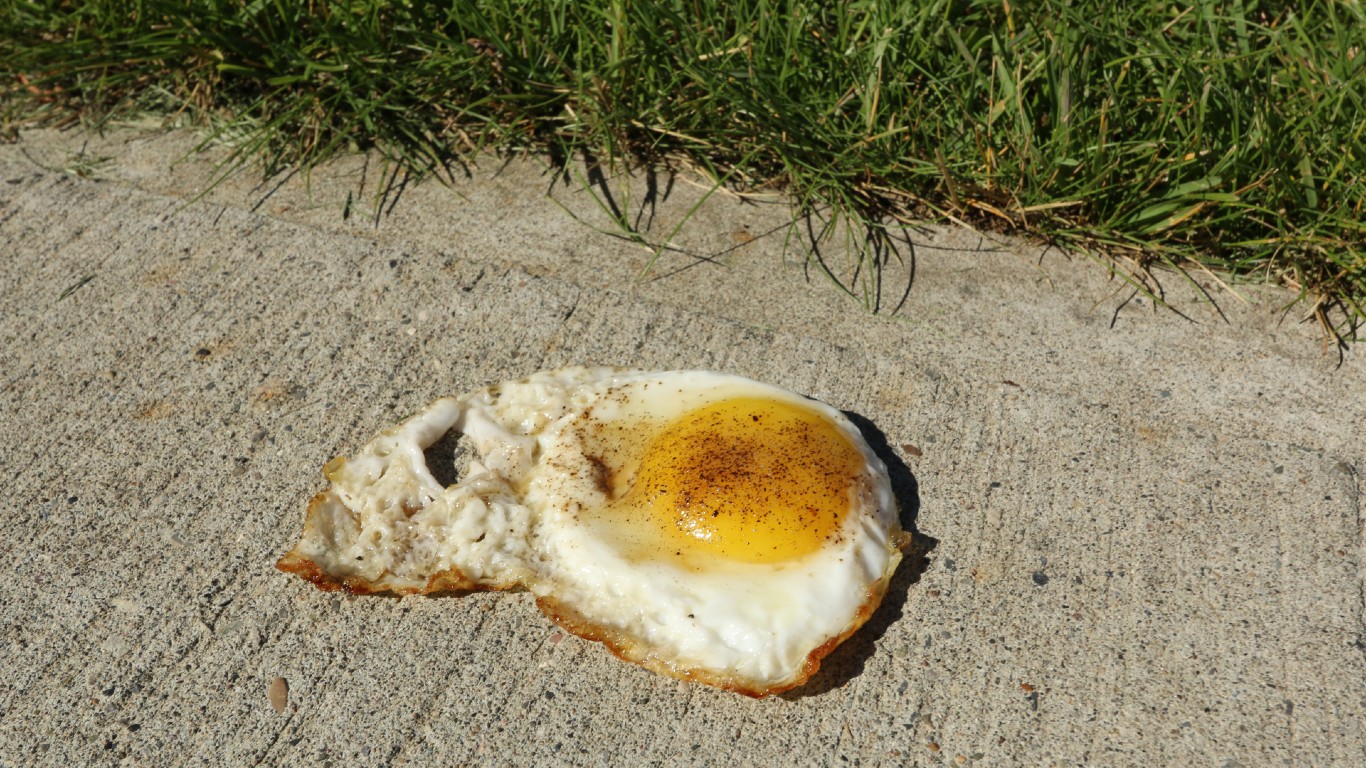
3. Arizona
> Tradition: Frying eggs on the sidewalk
> When: Every July 4th
It’s no secret that it gets really hot in the summer in Arizona. Frying eggs on the sidewalk when the concrete is hot has grown to be such a popular activity that the city of Oatman hosts a Sidewalk Egg Frying Contest every Fourth of July. There is a catch, though. The concrete is never actually hot enough to fully cook an egg, so people use magnifying glasses and mirrors to help the process.
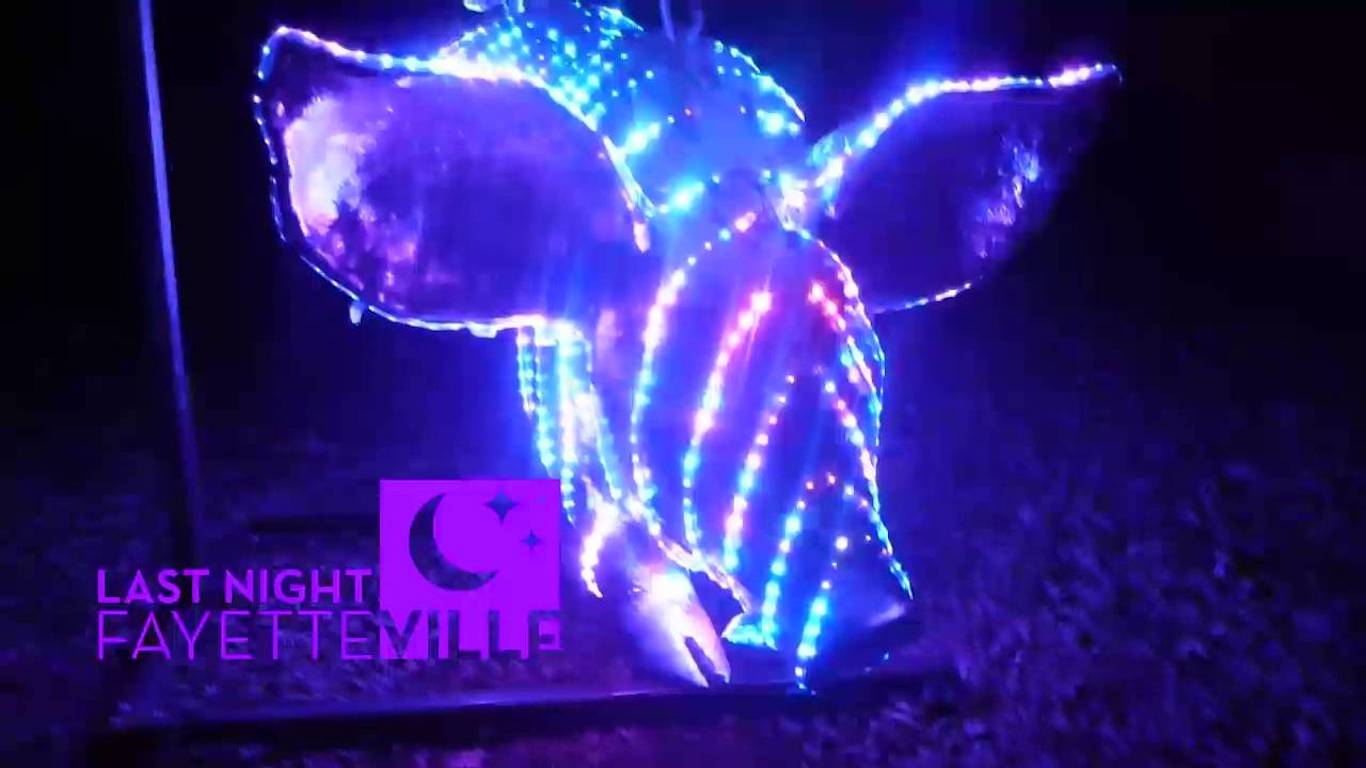
4. Arkansas
> Tradition: Hog drop on New Year’s
> When: New Year’s
In New York, revelers bring in the new year by watching the ball drop in Times Square. In Fayetteville, Arkansas, celebrants watch a gold-painted artificial hog descend to ring in the new year. The dropping of the hog is followed by a fireworks display.
[in-text-ad-2]
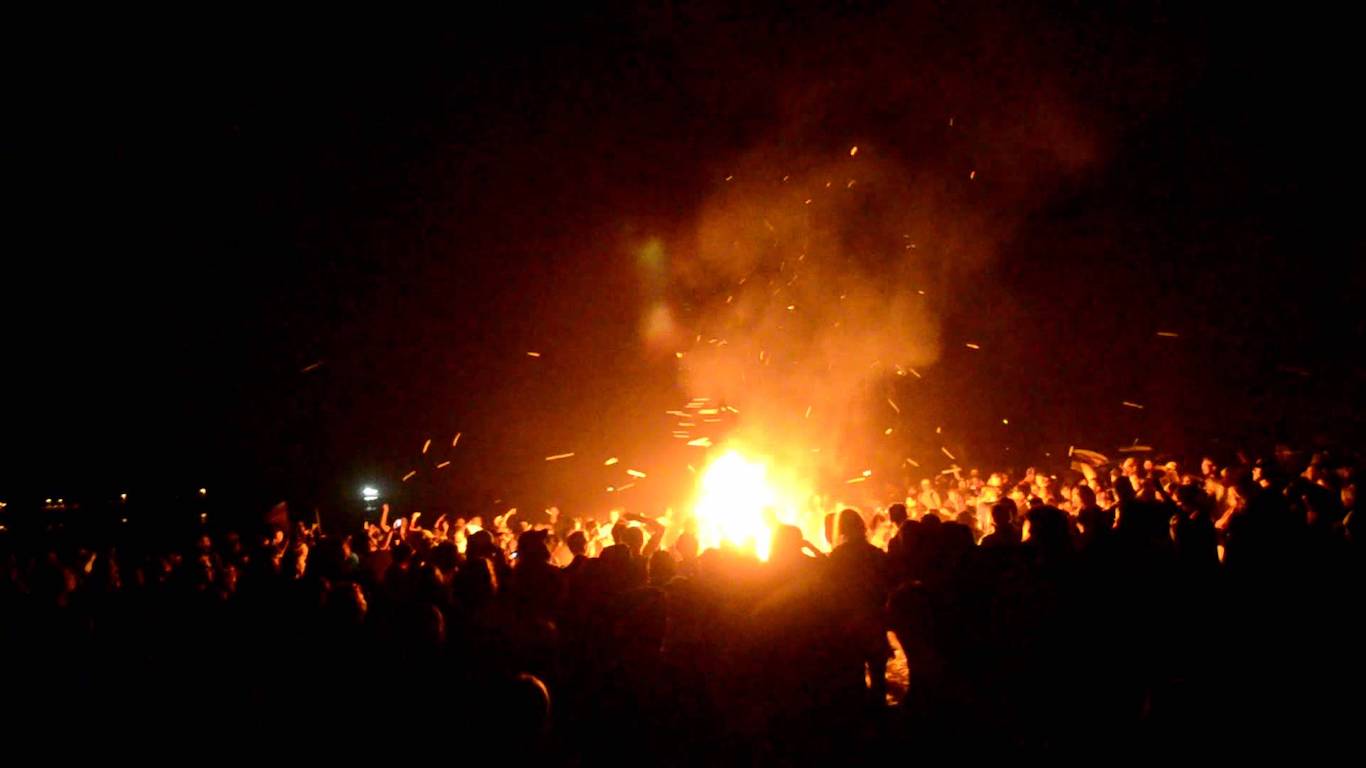
5. California
> Tradition: Marshmallow fight
> When: July 4
People at Ogden Beach in California mark the founding of the nation by holding a marshmallow fight. The tradition began in the 1980s, when two families pelted each other with the gooey treats. The event grew in popularity and city residents were fearful that the exuberance was getting out of control. In recent years, the event has marsh-mellowed a bit.
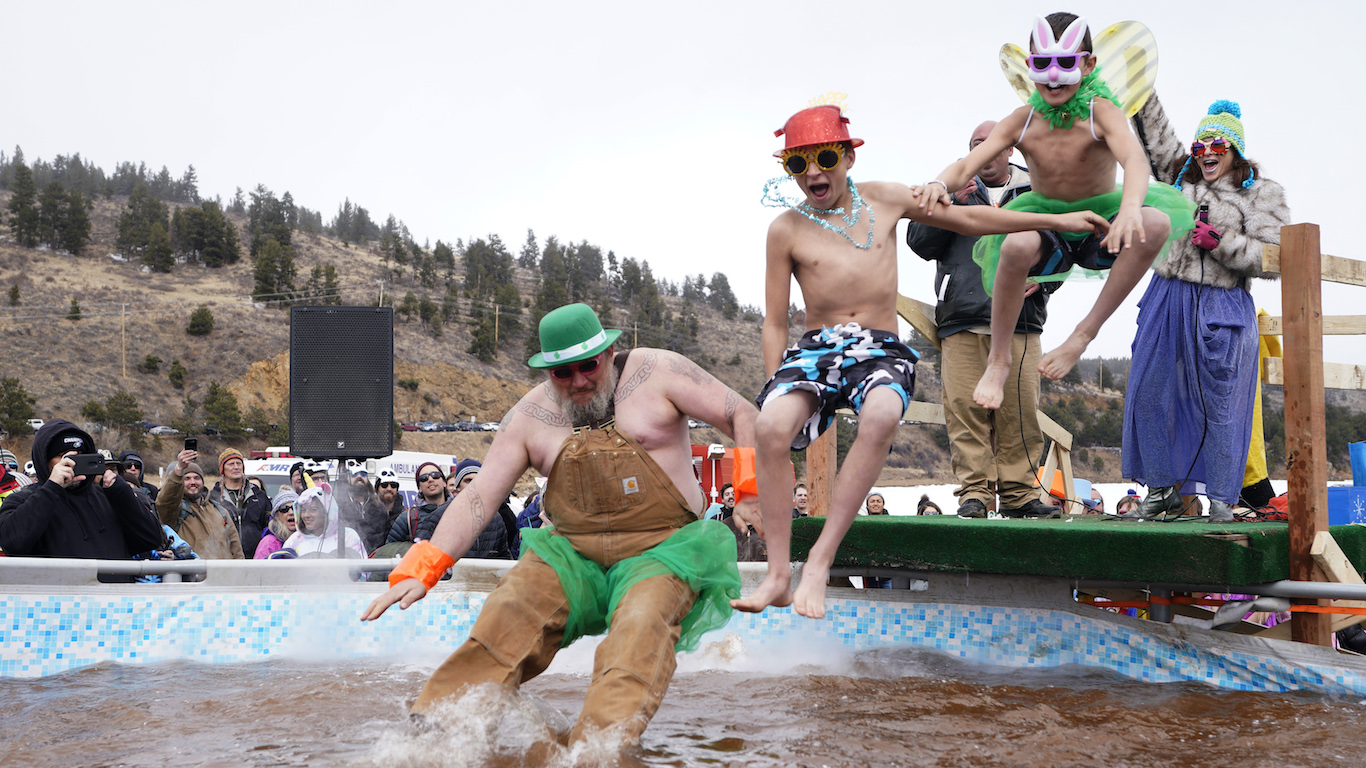
6. Colorado
> Tradition: Frozen Dead Guy Days
> When: Three days in March
Frozen Dead Guy Days are coffin races held in Nederland, Colorado. The competition consists of six “pallbearers,” who carry another team member in the coffin over an obstacle course of snow and mud. The event is named after a man who passed away in 1989 and is kept in a cryogenic state in a shed in Nederland. The event, which began in 2001, also includes a salmon toss and a hearse parade.
[in-text-ad]
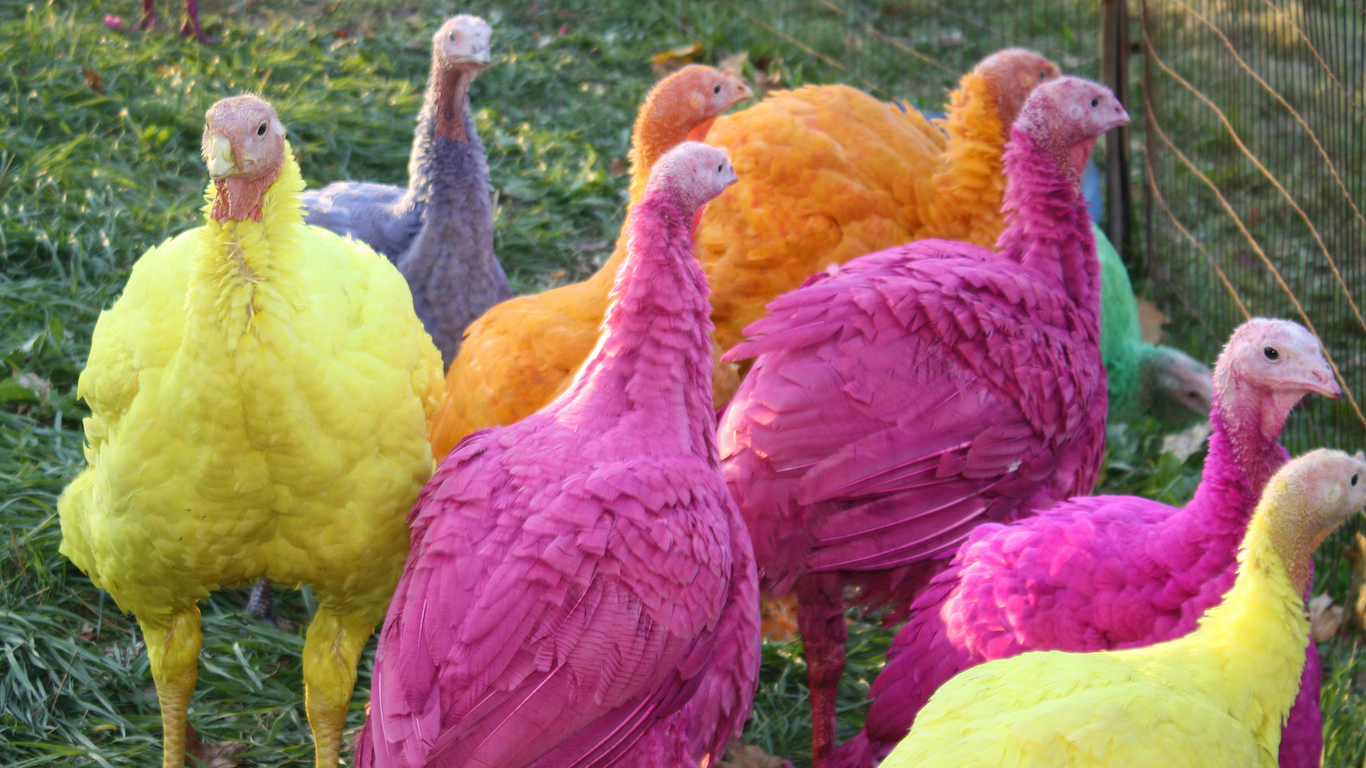
7. Connecticut
> Tradition: Turkeys painted neon colors
> When: Weeks before Thanksgiving
Each year, the turkeys at one turkey farm in Guilford, Connecticut, are painted in neon colors ahead of Thanksgiving. The dye is not toxic and vegetable-based. The tradition began about 45 years ago by the turkey farm owner’s grandmother to entertain children.
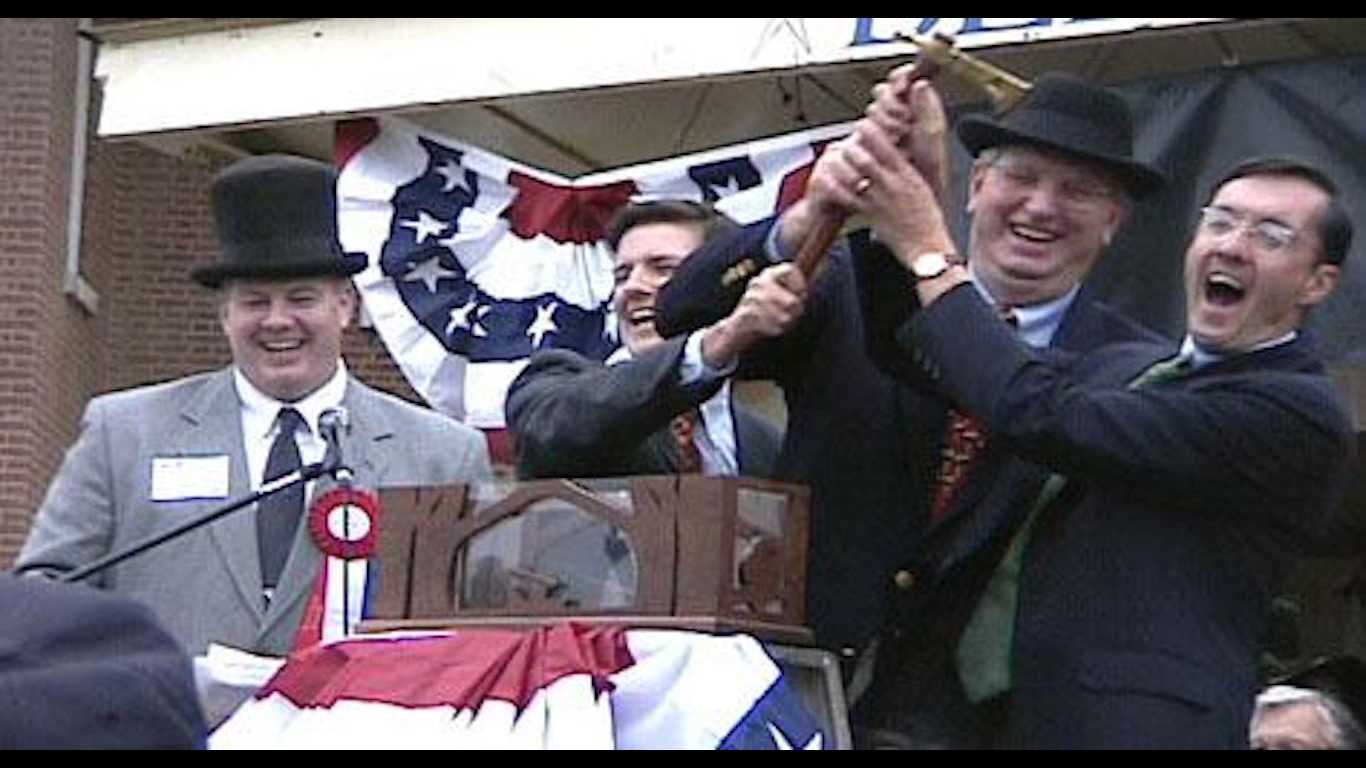
8. Delaware
> Tradition: Return Day
> When: Thursday after Election Day
Return Day is a Delaware tradition and a state holiday in which officials from the Democratic and Republican parties meet in Georgetown to “bury the hatchet” to end differences arising from the recently concluded election campaign. Officials meet on stage and together stuff a hatchet in a box of sand.
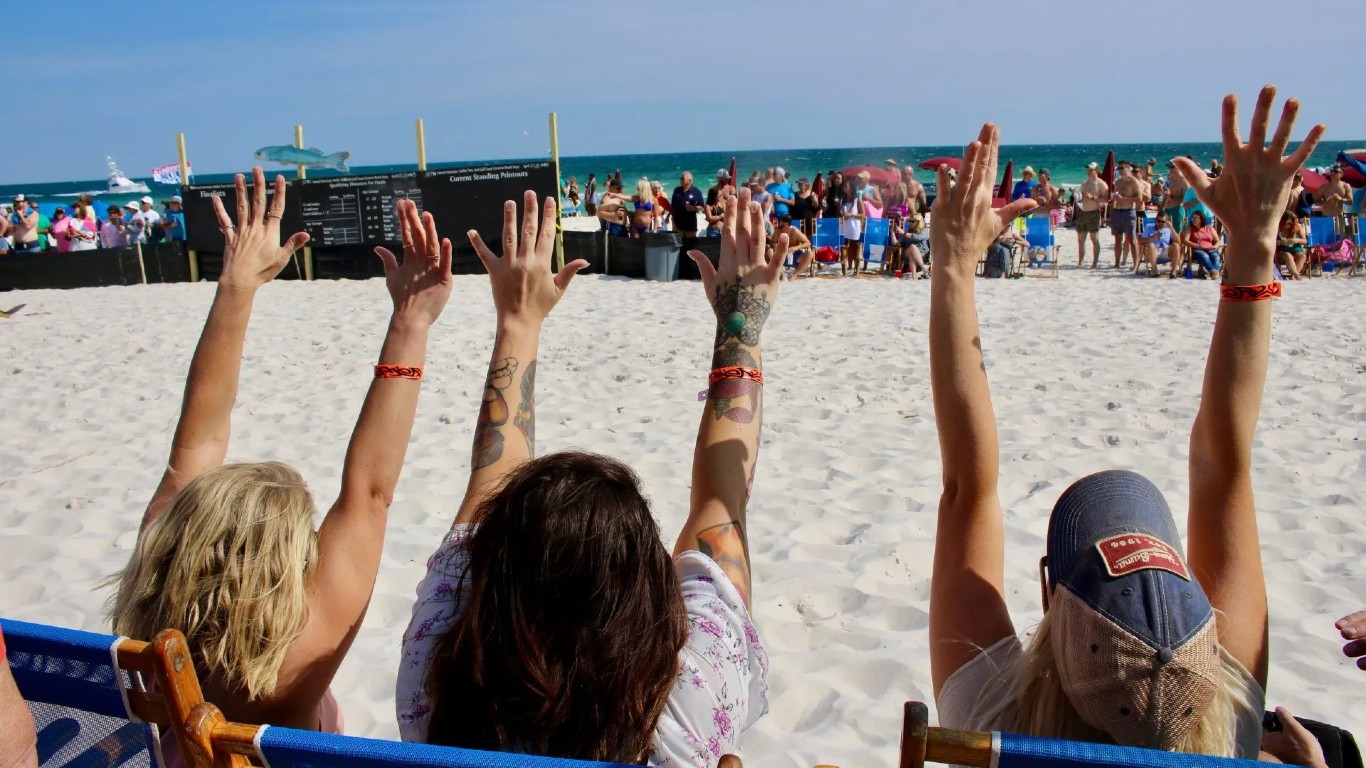
9. Florida
> Tradition: Mullet Toss
> When: Every April
This competition is not about the hairstyle but about the fish. This is a contest among Perdido Key residents and visitors who try to throw a mullet fish from Florida into Alabama. The festival is as much about the beach party as it is about seeing who throws the dead fish the farthest.
[in-text-ad-2]
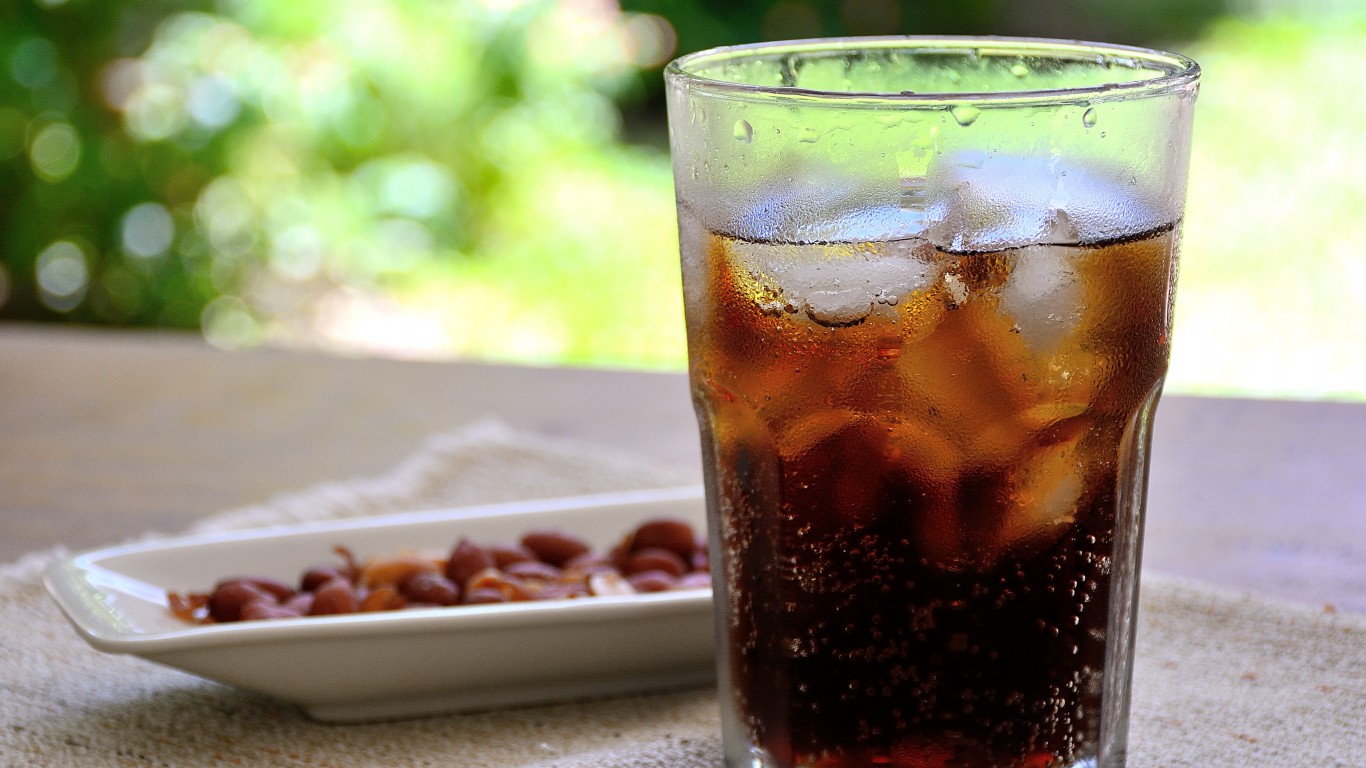
10. Georgia
> Tradition: Peanuts in Coke
> When: Any time
Dropping peanuts in coke is not a new idea. In fact, it was a very popular trend in the 1920s — anywhere from Georgia to southern Virginia. Today, peanuts in coke is referred to as a Southern tradition, but Georgia seems to have taken the tradition a step further. The state has a famous pie that includes these two famous ingredients — the Georgia Peanut Pie With Coca-Cola Glaze.
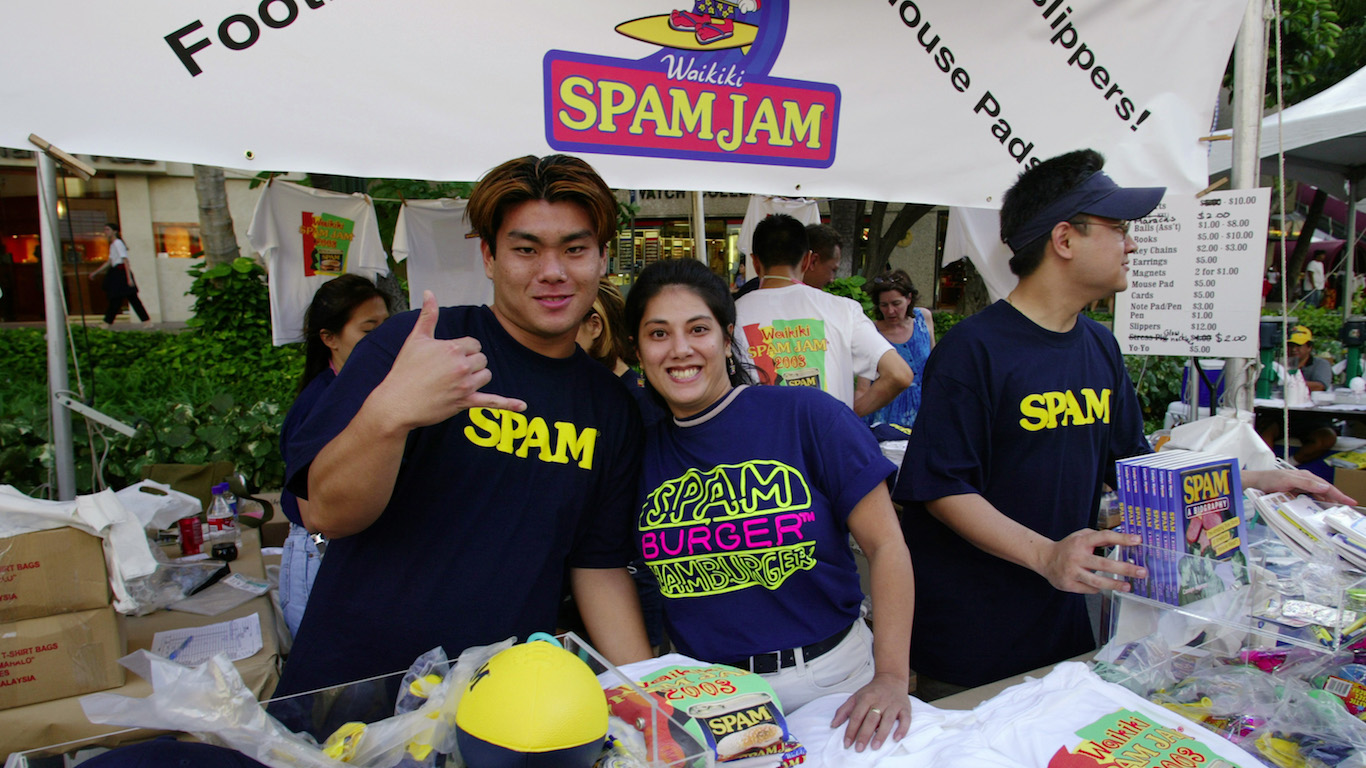
11. Hawaii
> Tradition: Eating Spam
> When: Any time
Spam, the canned cooked meat, has been ridiculed since its inception. But don’t make fun of it in Hawaii, where it is eaten all over the islands. Spam, short for spiced ham, was introduced to the islands during World War II when it was served to American soldiers. The meat did not need to be refrigerated and has a long shelf life. Spam can be found on McDonald’s and Burger King menus in Hawaii.
[in-text-ad]
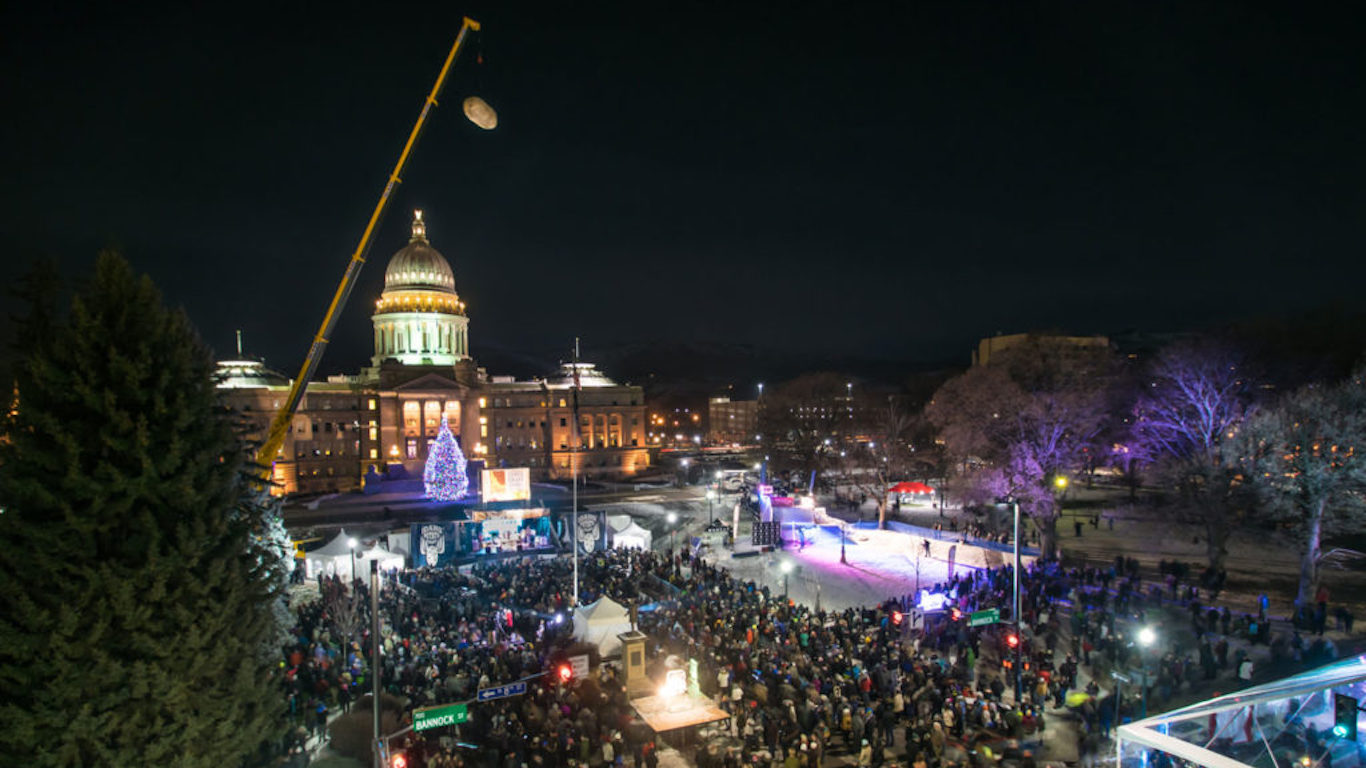
12. Idaho
> Tradition: Potato drop
> When: New Year’s
At the stroke of midnight on New Year’s Eve, Idahoans lower a glowing potato replica from a crane in front of the capitol building in Boise. The tradition is less than 10 years old, but it has grown in popularity, with around 35,000 people attending festivities in 2017.
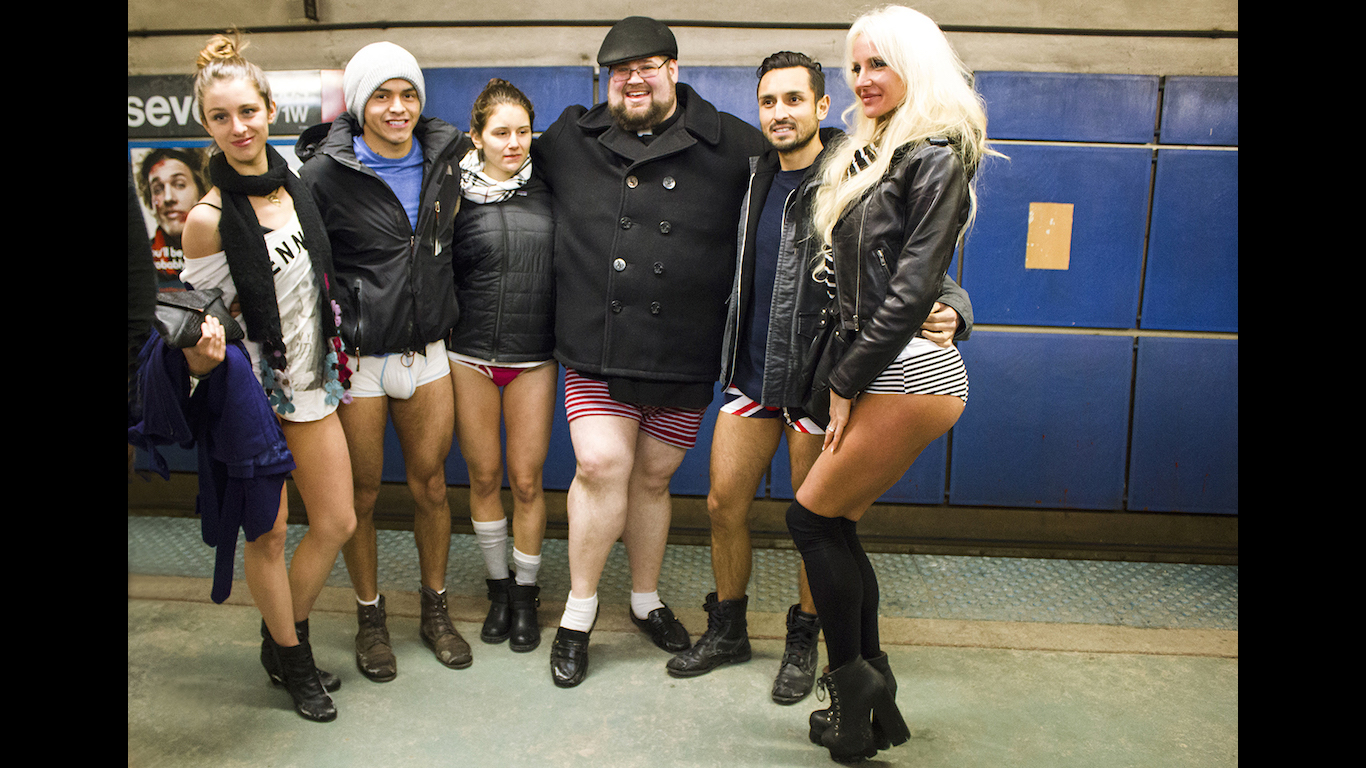
13. Illinois
> Tradition: No Pants Subway Ride
> When: Once a year
The merry pranksters at art troupe Improv Everywhere organize an annual no-pants subway ride on Chicago’s subway cars. Participants have to be hearty folks, because this year’s event is held in January. The ride took place on the city’s Red Line this year.

14. Indiana
> Tradition: Pouring milk on Indy 500 winners
> When: Every year at Indy 500
Indianapolis 500 winners pour milk on themselves — much like NFL coaches whose teams win the Super Bowl get a huge bucket of Gatorade poured over them. The custom started back in the 1930s, when three-time winner Louis Meyer drank some buttermilk after winning a race. This is such a popular tradition today that on race day Indiana farmers select the Milk Person who is charged with delivering the milk to the winning driver.
[in-text-ad-2]
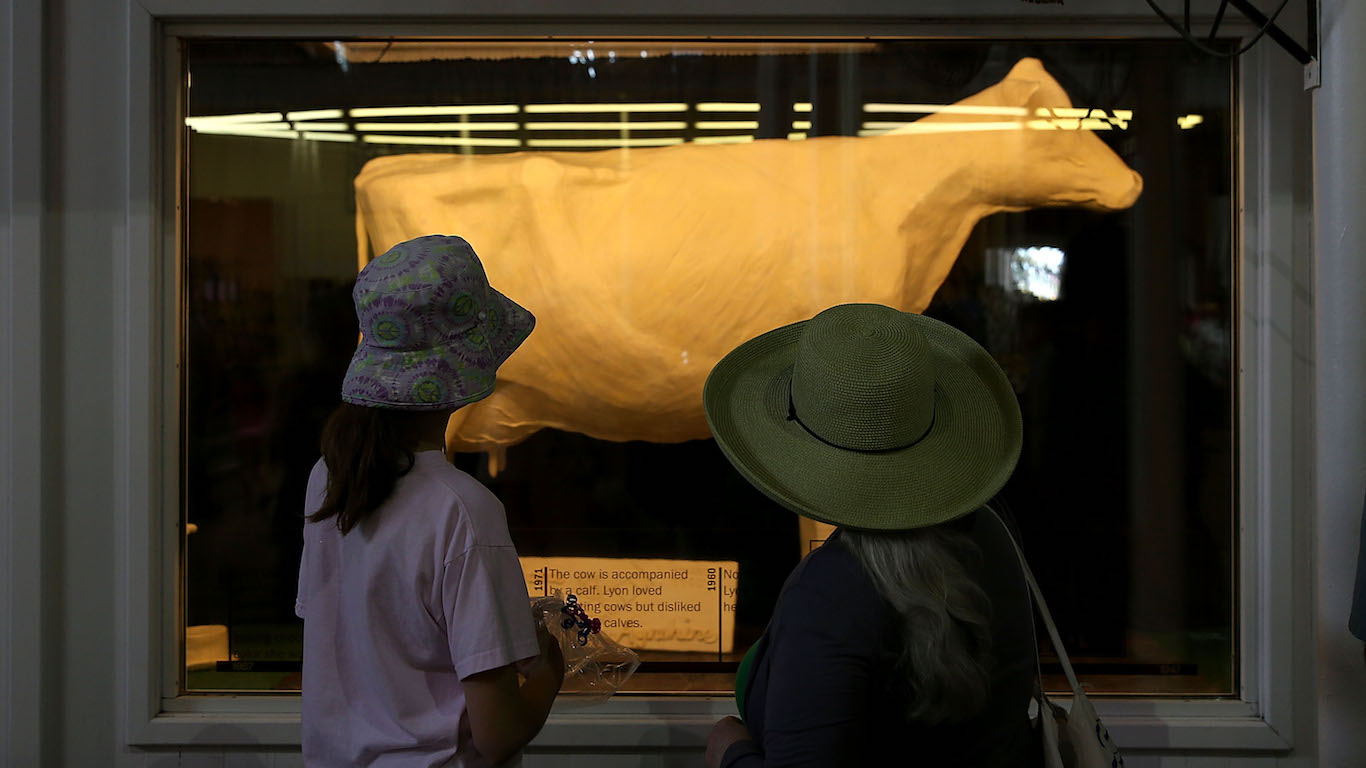
15. Iowa
> Tradition: Butter Cow Sculpture
> When: At Iowa State Fair
The Iowa State Fair is a very big deal. And for a lot of people, one of the highlights is seeing a cow made of pure Iowan butter. Thousands of people visit the festival to see the massive 600-pound bovine masterpiece.
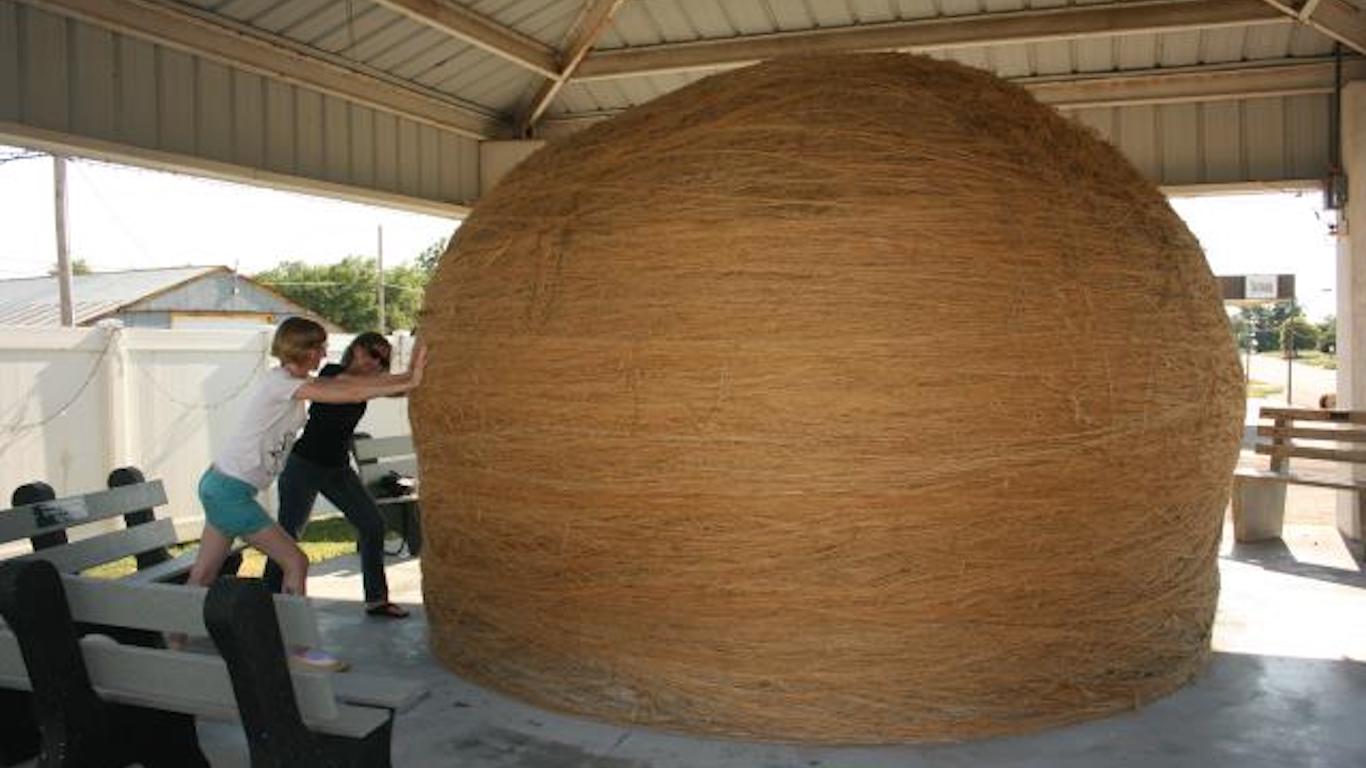
16. Kansas
> Tradition: Taking photo with biggest ball of twine
> When: Any time
The world’s biggest ball of twine is in Cawker City, Kansas, and people come from miles around to get their photo taken with it. A farmer named Frank Stoeber began winding the twine ball in 1953, and people continue adding to it to this day. If unwound, the twine would extend to about 8 million feet. Kansas residents consider the twine one of the eight wonders of Kansas.
[in-text-ad]
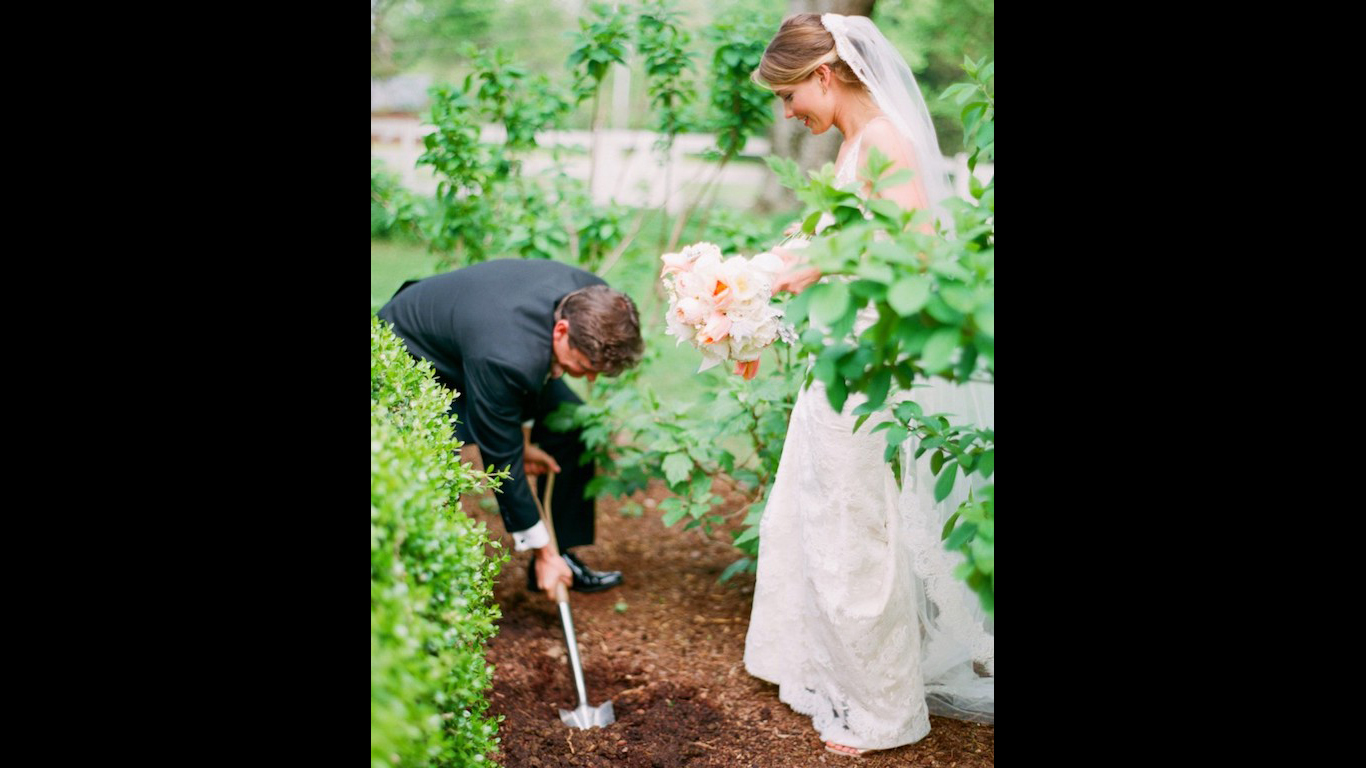
17. Kentucky
> Tradition: Burying bottle of bourbon at wedding site
> When: Any time before wedding
Besides college basketball and thoroughbred horses, Kentucky is known for its bourbon. One of the traditions in the Bluegrass State is for a bride and groom to bury a bottle of bourbon at the wedding site to keep rain from ruining their big day. The burial must take place no later than a month prior to the wedding, and the bottle must be full and placed upside down in the ground. After the ceremony, the bottle is dug up and its contents imbibed by wedding guests.
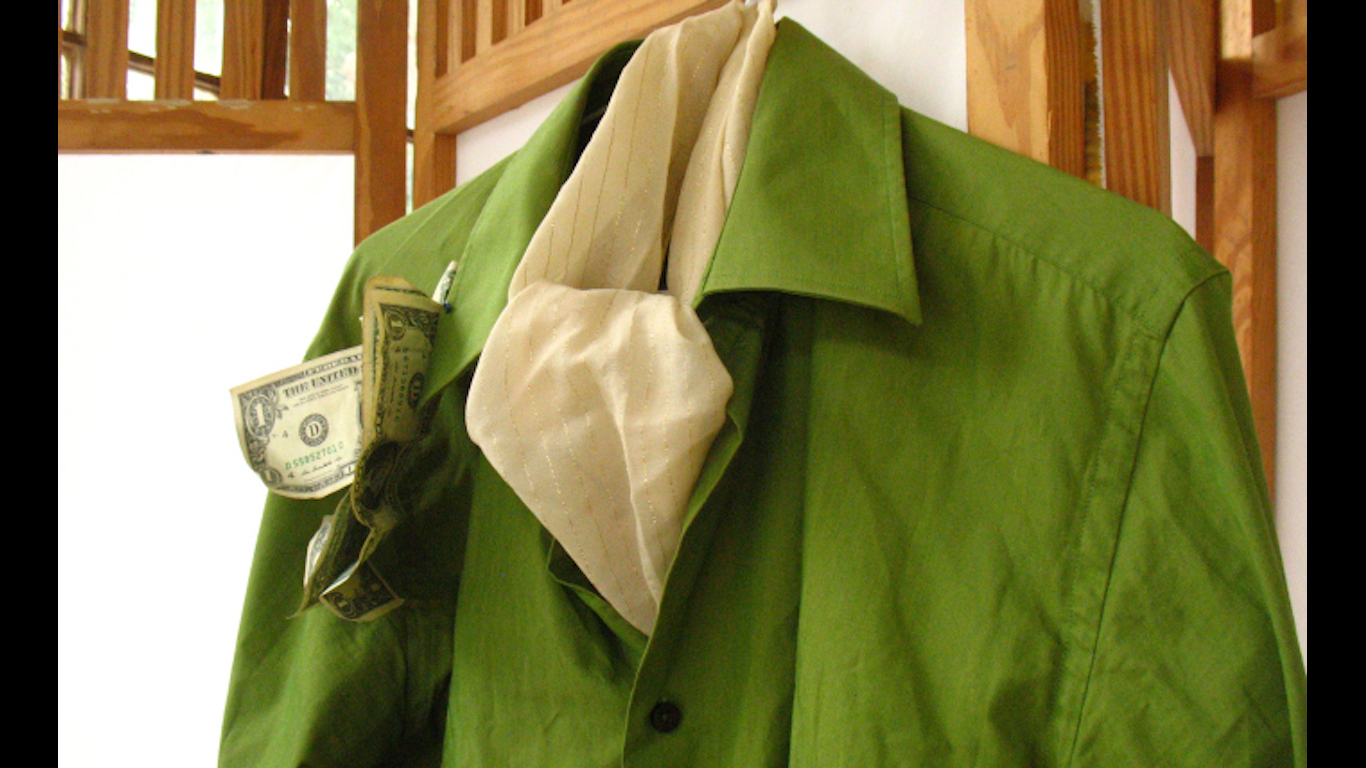
18. Louisiana
> Tradition: Pinning $1 to lapel of birthday celebrant
> When: Celebrant’s birthday
There are plenty of superstitions and customs down in the bayou. One of the quirkier ones is to pin a $1 bill on the lapel of a shirt of someone celebrating his or her birthday. The idea is to get more people to follow suit to create a cash corsage. The money is used to buy drinks for the birthday celebration.
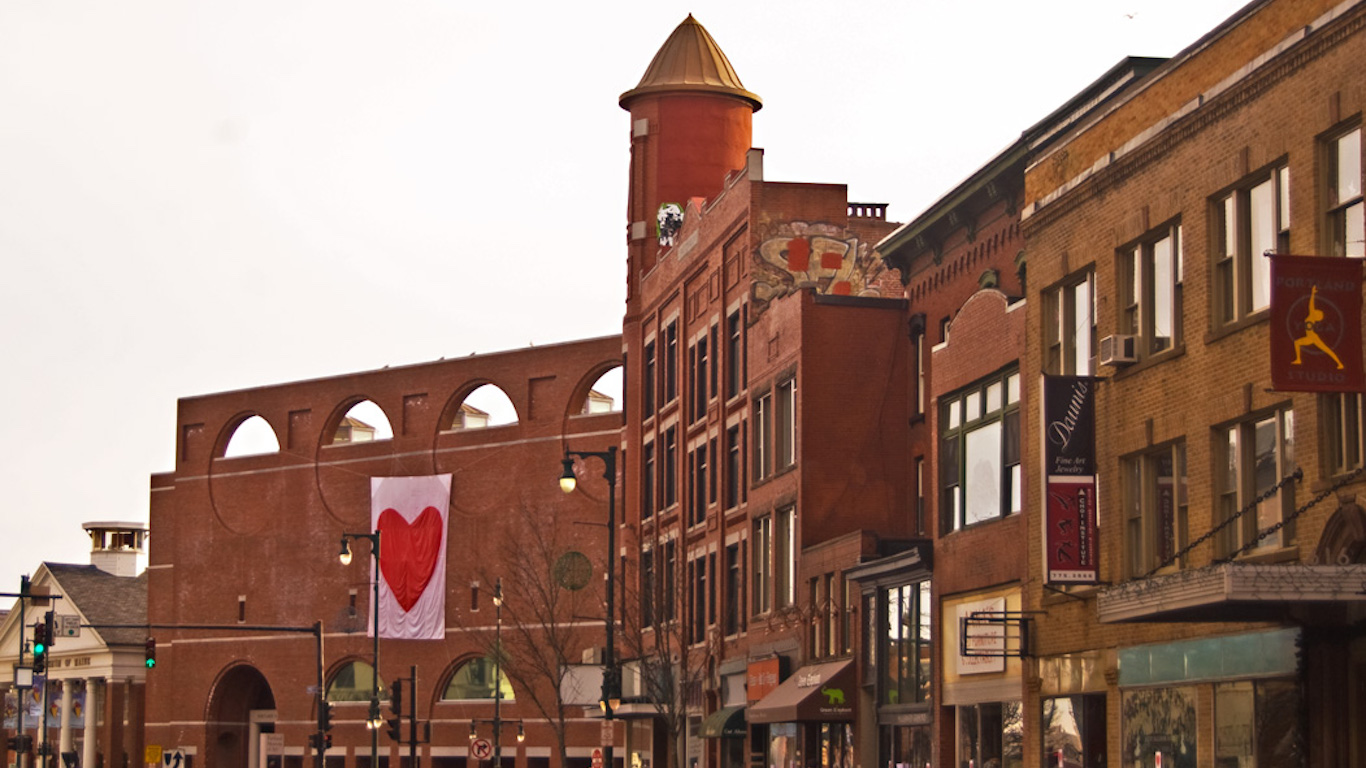
19. Maine
> Tradition: Valentine’s Day bandit
> When: Valentine’s Day
On Valentine’s Day in 1976, red hearts printed on paper began to appear in storefronts, windows, and telephone poles in Portland. No one claimed credit, or responsibility, for the deed. In the years that followed, the so-called Valentine’s Day bandit left red hearts on federal buildings and police cars. The bandit also hung a giant heart at the civic center in 1984. The unknown bandit continues this tradition to this day.
[in-text-ad-2]
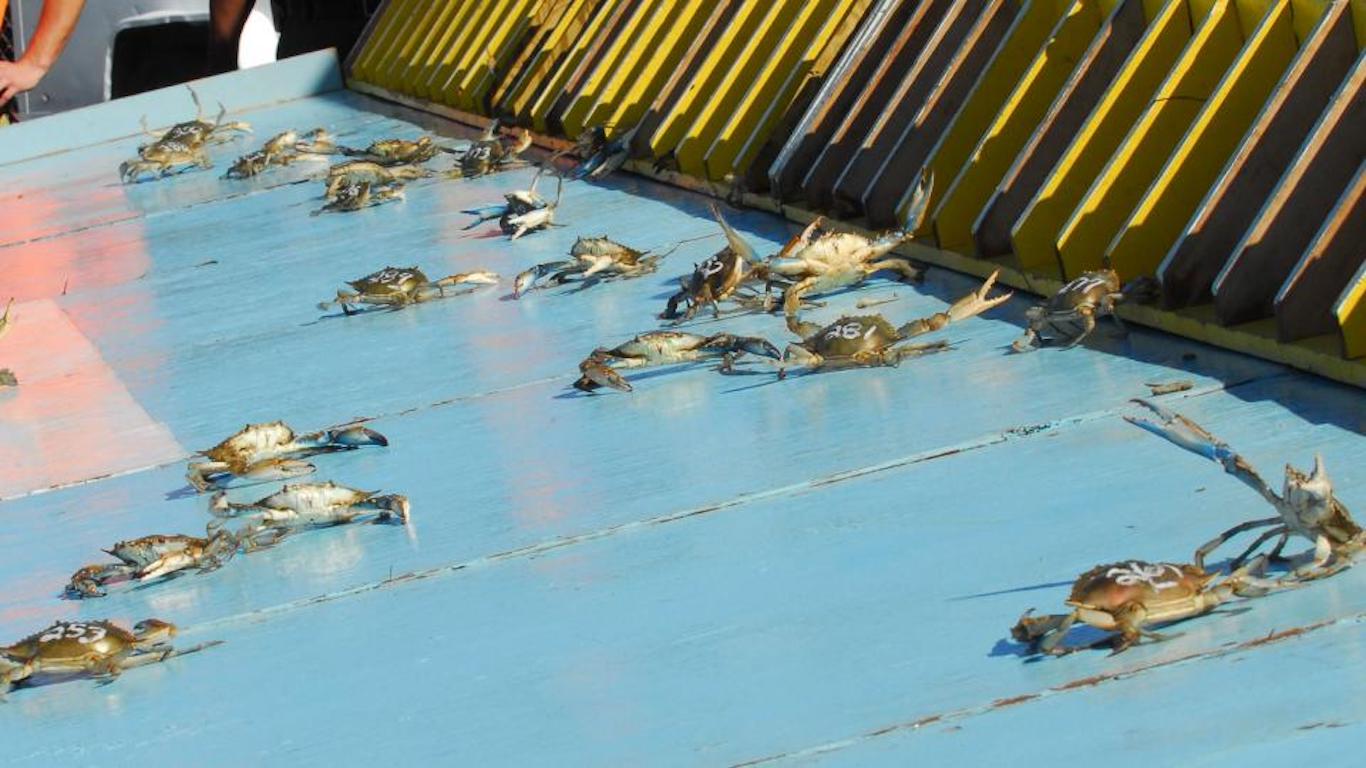
20. Maryland
> Tradition: Crab Derby
> When: Labor Day weekend
Maryland and crabs go together like Maine and lobsters. The National Hard Crab Derby is an annual event held in the town of Crisfield, which calls itself the Crab Capital of the World. The event features parades, pageants, and rides. There are also two crab races — one for the general public and the other for crabs from all 50 states.
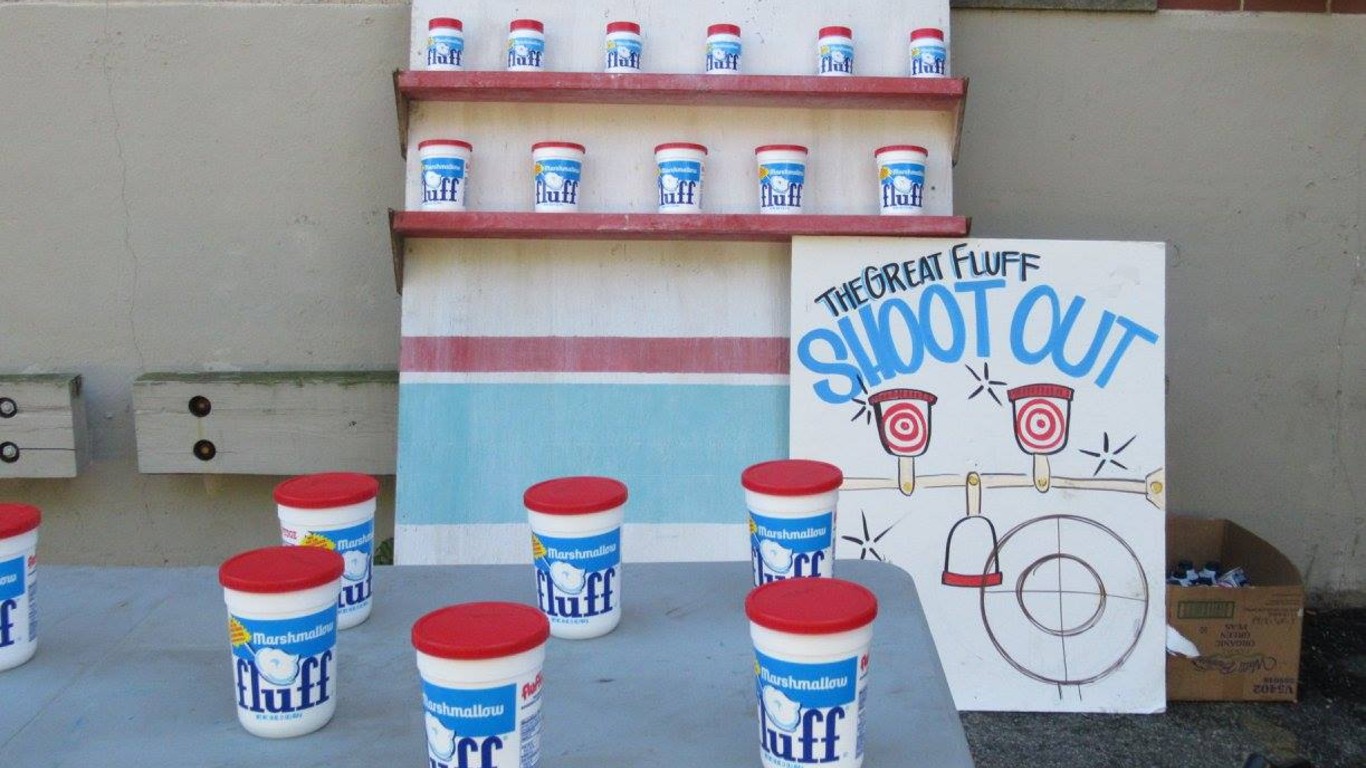
21. Massachusetts
> Tradition: Fluff Festival
> When: Early fall
Marshmallow Fluff was invented in the Boston suburb of Somerville, and the city honors this little piece of its history and the tasty creation every year with a festival. Last year’s festival took place virtually from Union Square due to the COVID-19 pandemic.
[in-text-ad]

22. Michigan
> Tradition: Cherry pit spitting
> When: July 7
The 45th annual cherry pit-spitting championship will be held July 7 at the Tree-Mendus Fruit Farm in Eau Claire. Rick “Pellet Gun” Krause from Arizona is a cherry-pit spitting dynasty, having won the title 17 times, including the championship last year. Krause was victorious with a shot of 57 feet, 11 inches.
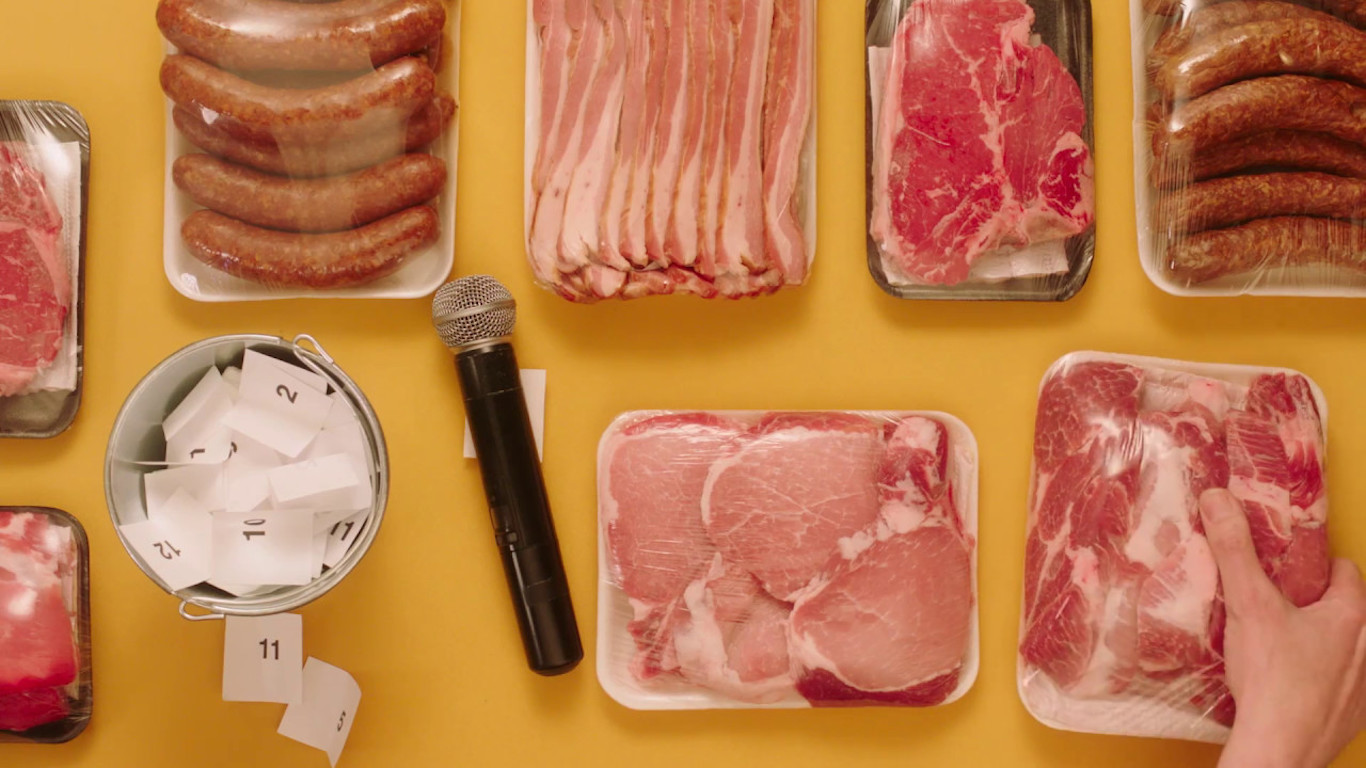
23. Minnesota
> Tradition: Raffling meat
> When: Once a week
Meat raffles are part of the social fabric of Minnesota, and they have been held in that state for years. These raffles, which are social events like bingo, got their start in local bars. In recent years, the event has become popular in trendy watering holes in Minnesota cities. Participants pony up a dollar for a ticket for a chance to win a packet of meat.
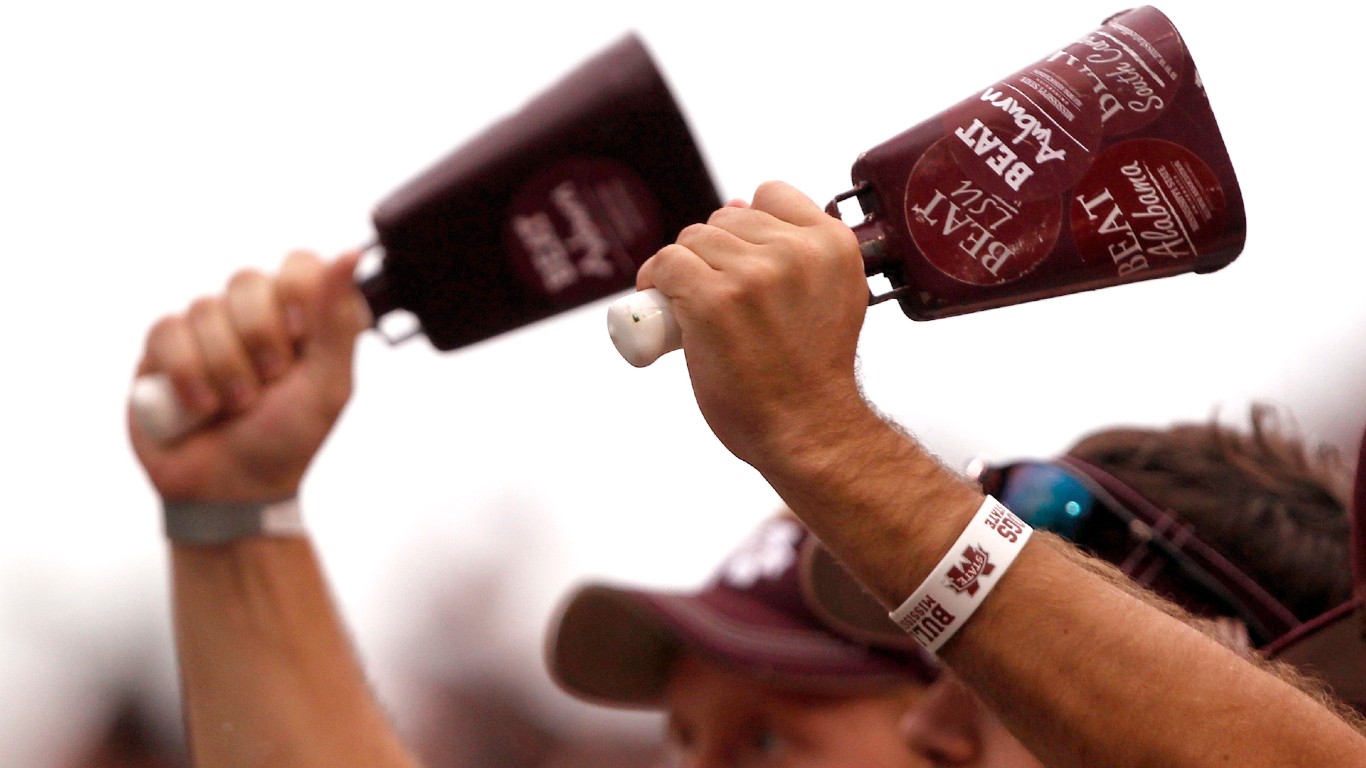
24. Mississippi
> Tradition: Ringing cowbells
> When: At Mississippi State games
Cowbells are a staple at Mississippi State football games. No one is sure when exactly, but some time in the 1930s a cow wandered near the field where Mississippi State was playing their arch rival Ole Miss. Mississippi State won, and since then cowbells have been viewed as a lucky charm.
[in-text-ad-2]
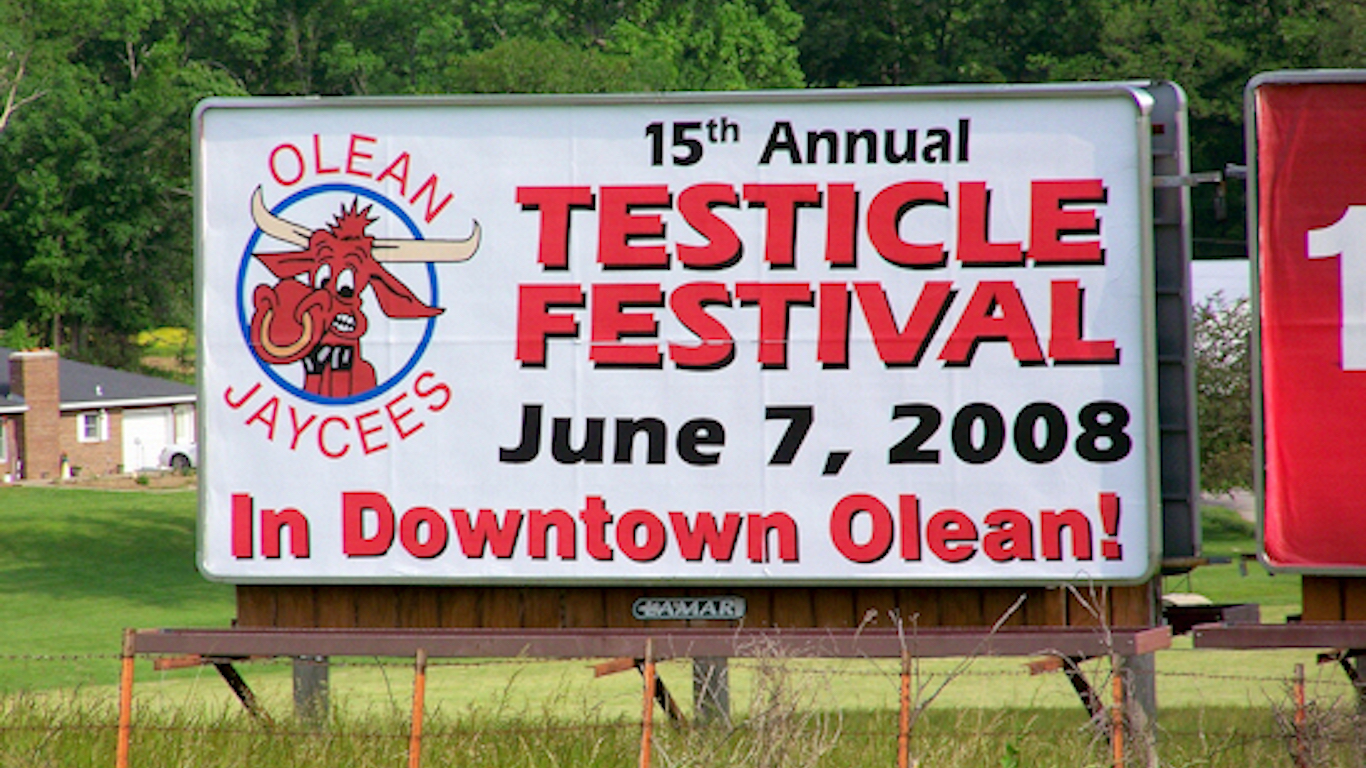
25. Missouri
> Tradition: Testicle Festival
> When: June 2
This festival is held in the town of Olean, Missouri, and features such delicacies as Rocky Mountain Oysters (cattle testicles) and turkey testicles. If that doesn’t make your mouth water, there are other food options at the event, which is celebrating its 25th year this year.

26. Montana
> Tradition: Tricycle race in underwear
> When: First week of August
At the annual Testicle Festival in Clinton, Montana, men and women are invited to compete in the Undie 500, where contestants strip down to their underwear and race around in tricycles. The event has been held since 1989.
[in-text-ad]
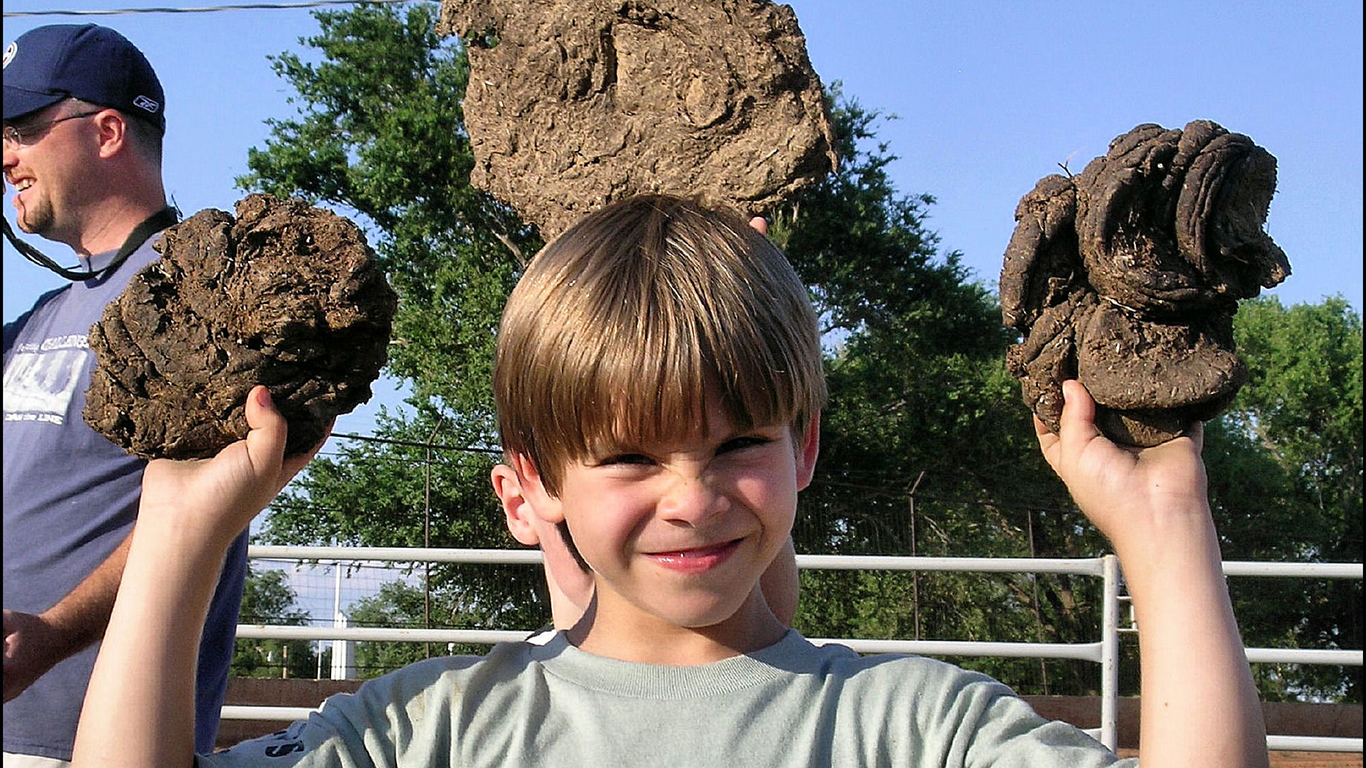
27. Nebraska
> Tradition: Buffalo-chip throwing
> When: Spring
Buffalo-chip throwing is one of the highlights of Chadron’s Fur Trade Days annual celebration of buckskinners, traders, and Native Americns. Participants compete to see who will throw bison poop the farthest. The record is 204 feet and was set in 1990.

28. Nevada
> Tradition: Lucky Duck Family Festival
> When: September
Nevada is perhaps best known for its various forms of adult entertainment, but one of the most popular annual events is very family friendly. The Lucky Duck Family Festival includes many family activities and free entertainment. One of the most anticipated festival events is the rubber ducks race. It’s when about 5,000 rubber ducks float in the pond at Town Square.
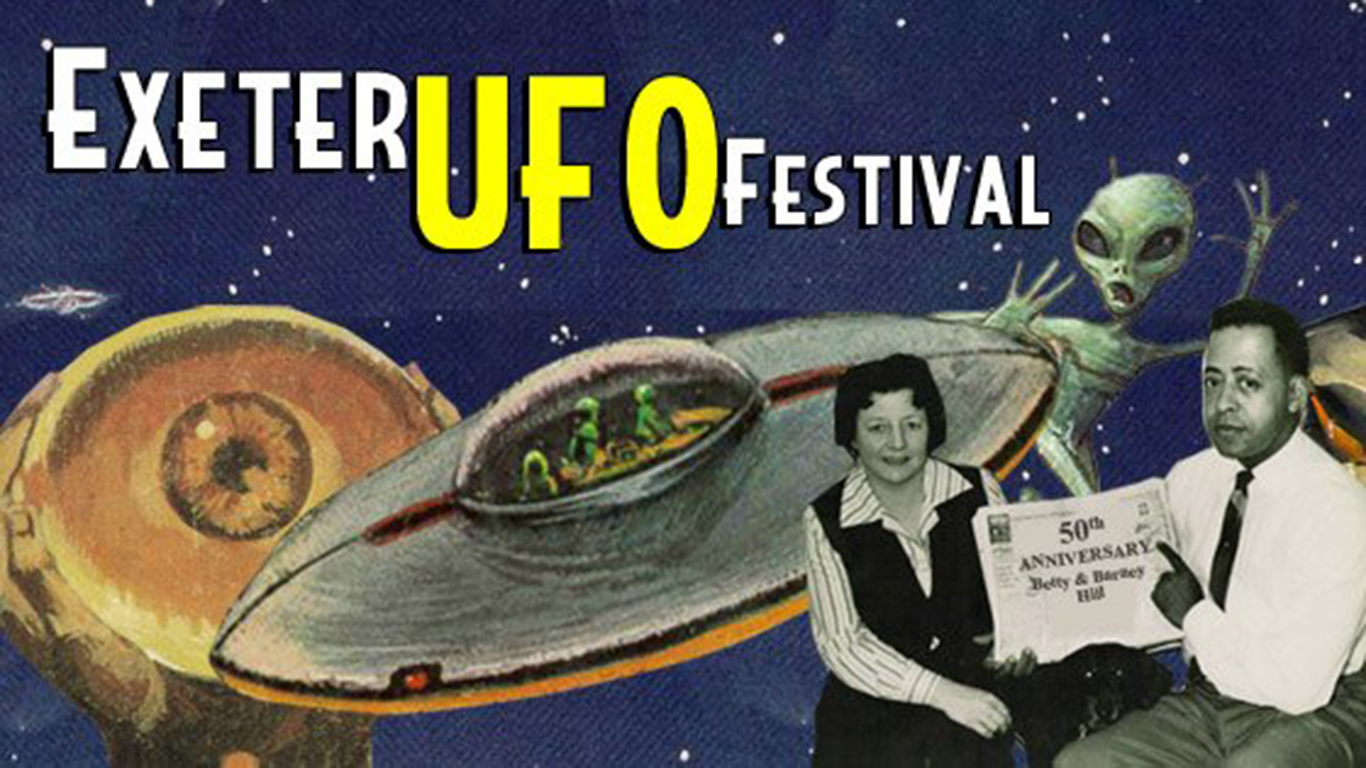
29. New Hampshire
> Tradition: UFO Festival
> When: Sept.1-2
The annual UFO Festival in Exeter, New Hampshire, has become a traditional event in New England for those who believe the truth is out there. New Hampshire has had a few celebrated UFO encounters, including the alleged abduction of a New Hampshire couple in 1961.
[in-text-ad-2]
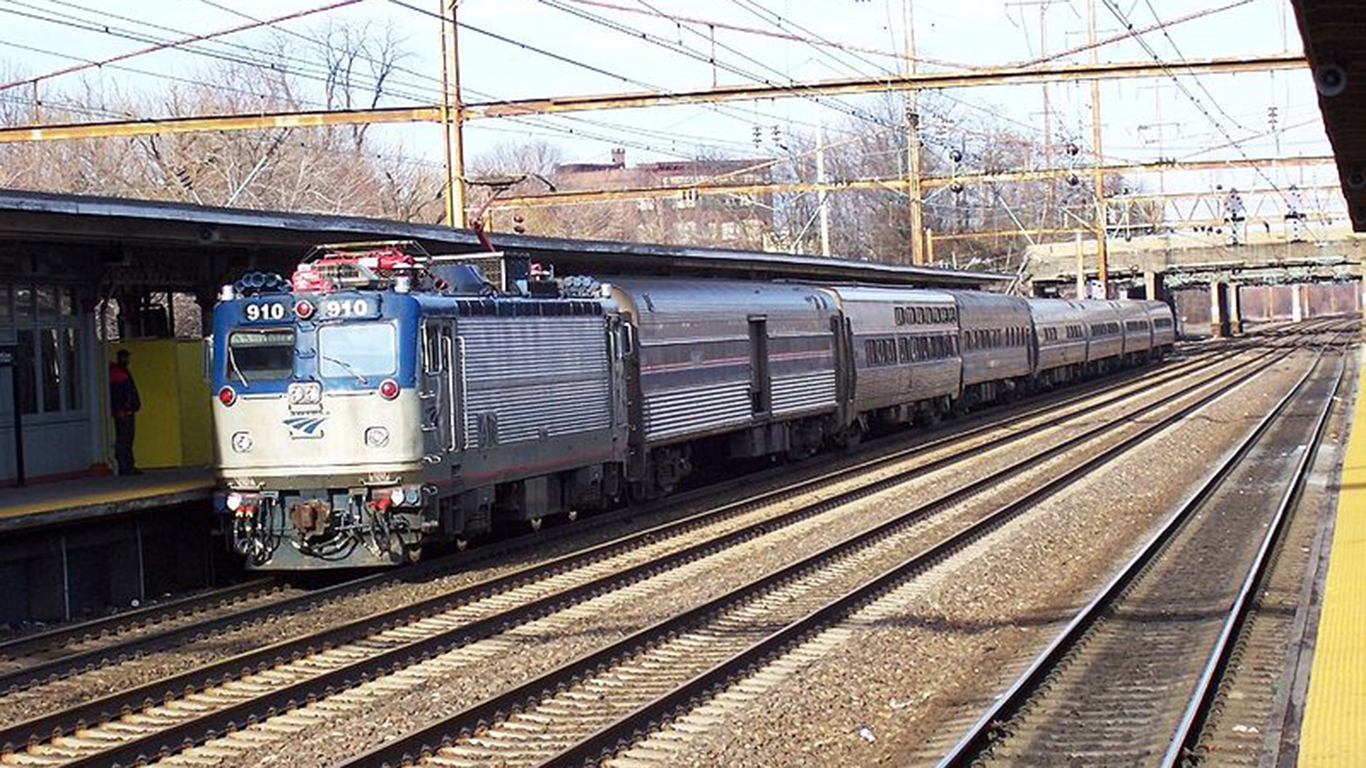
30. New Jersey
> Tradition: Walk to Washington
> When: Late winter
The “Walk to Washington” is not really a walk but a train ride from New Jersey to Washington D.C., in which politicians traverse the length of the train to schmooze reporters, lobbyists, and business leaders. Past events had been criticized for excessive drinking and boorish, sexist behavior by those on the train.
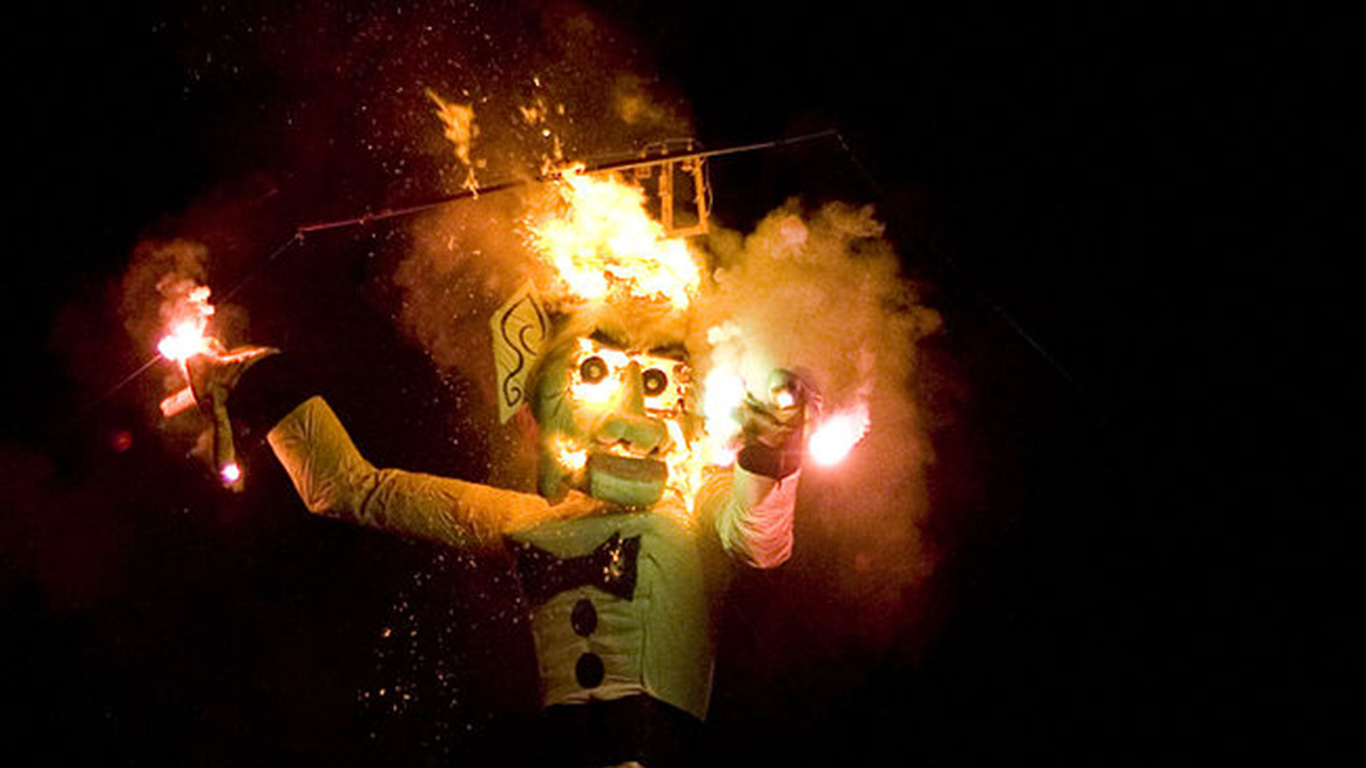
31. New Mexico
> Tradition: Zozobra
> When: Friday before Labor Day
Zozobra, also called “Old Man Gloom,” is a 50-foot ghostlike statue that is lit on fire in Santa Fe during the first weekend in September. Zozobra was created as a 6-foot puppet by artist Will Shuster in the 1920s and has since grown to its present height. The burning of Zozobra represents the extinguishing of gloom from the prior year.
[in-text-ad]
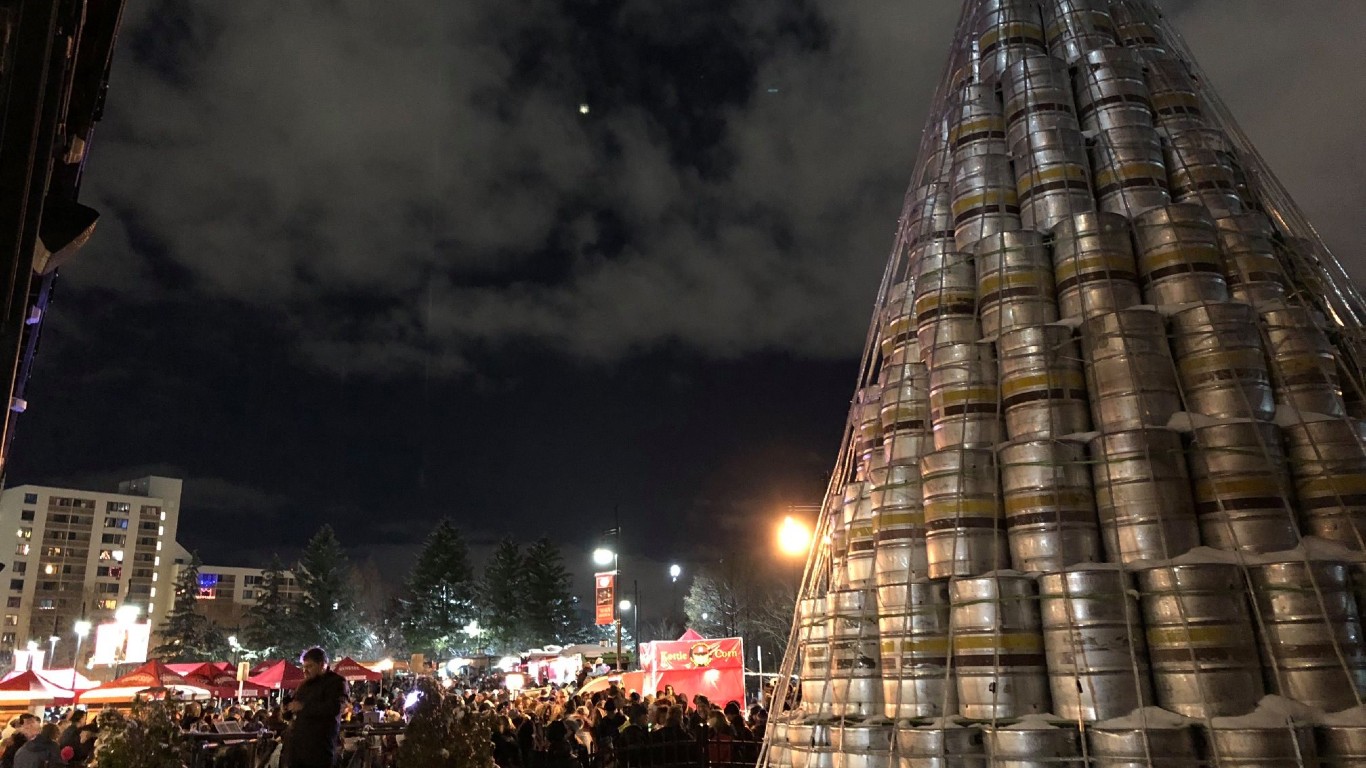
32. New York
> Tradition: The Keg Tree
> When: Holiday season
New York City has the ball drop in Times Square on New Year’s Eve, Coney Island has a mermaid parade in the summer, and Rochester, in upstate New York, has a 27-foot-tall Christmas tree made from 520 empty beer kegs. The tree was not lit in 2020 due to the pandemic and so locals competed by building their own keg trees in their homes.
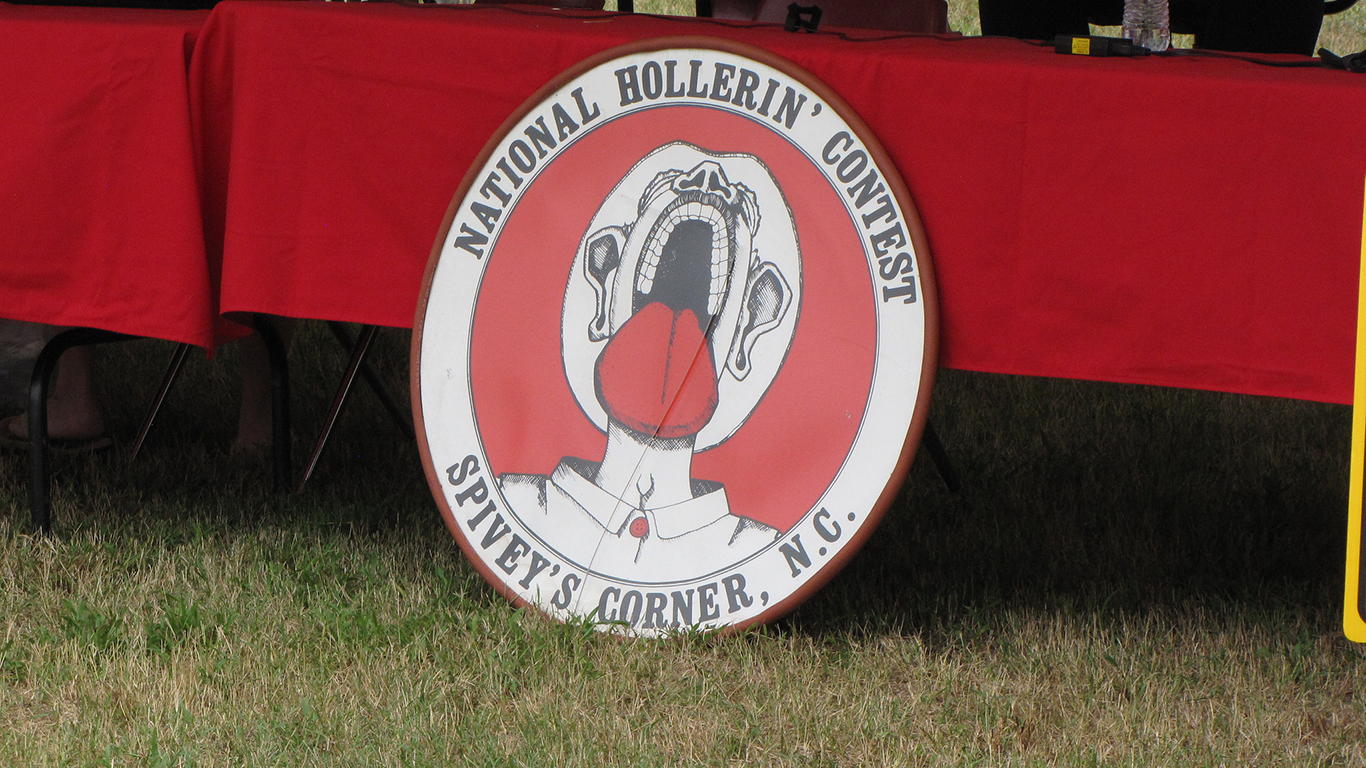
33. North Carolina
> Tradition: National Hollerin’ Contest
> When: October
The National Hollerin’ Contest pays homage to a unique form of communication used in the southeastern part of the United States. Started in 1969, the contest was held annually at Spivey’s Corner, North Carolina. Several times the winner would appear on The Tonight Show With Johnny Carson. The event was discontinued after 47 years in 2016, but it was revived and is now held in Hope Mills, North Carolina.
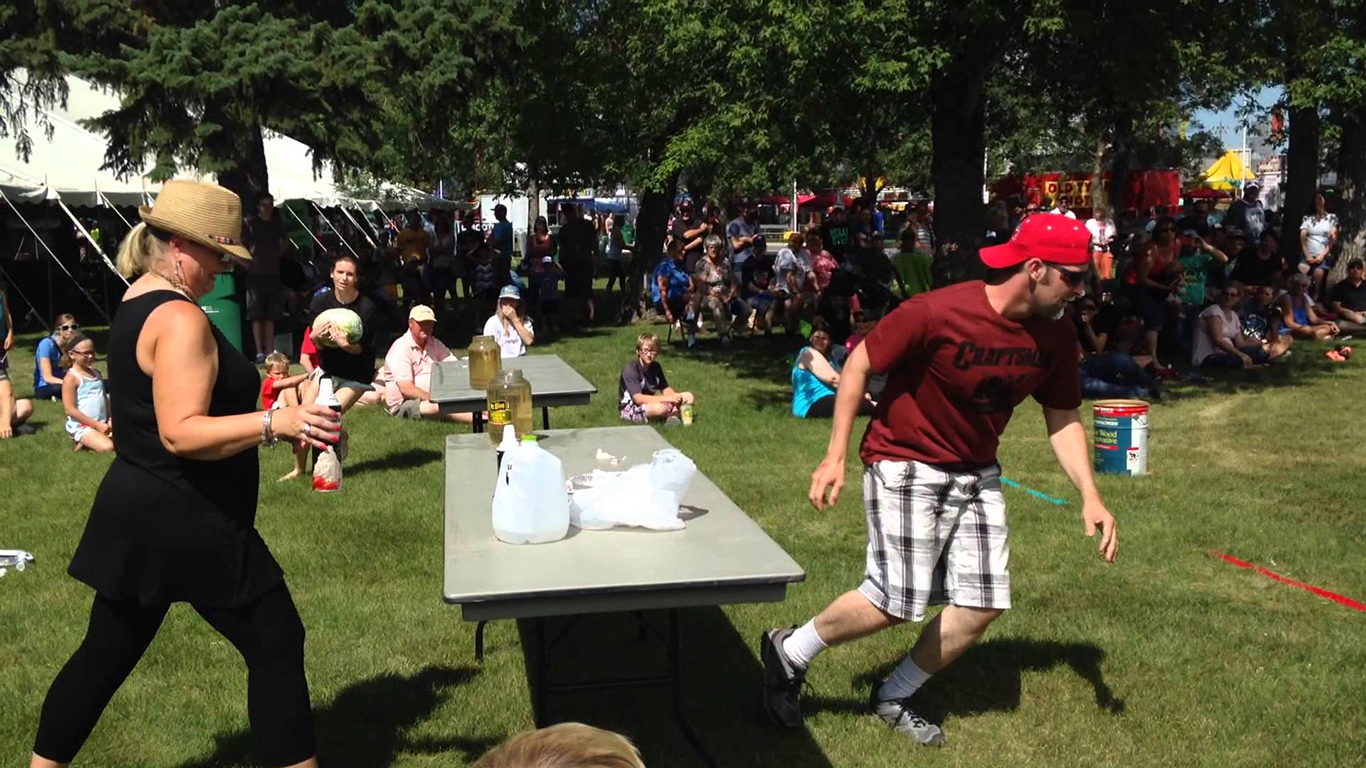
34. North Dakota
> Tradition: Redneck Relay at State Fair
> When: July 20-28
At the North Dakota State Fair, teams compete in a relay that includes the moonshine spit, the corn toss, planting one’s face in a pie to find candy, and carrying a watermelon slathered in Crisco.
[in-text-ad-2]
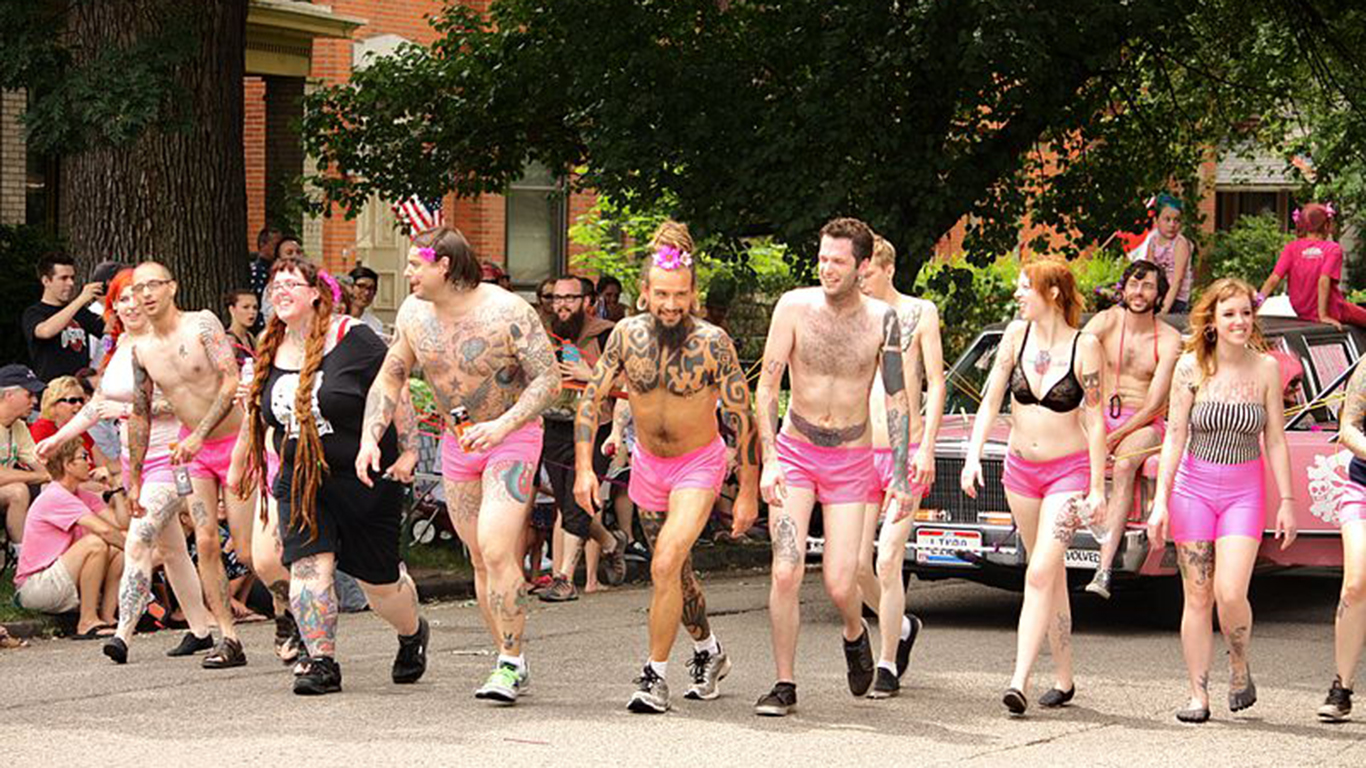
35. Ohio
> Tradition: Doo Dah Parade
> When: July 4
The Doo Dah Parade in Columbus, Ohio, is a colorful event that is open for anyone. It provides marchers an opportunity to express their opinions on any issue they choose and to dress as they like.

36. Oklahoma
> Tradition: Sucker Day Festival
> When:
Sucker Day Festival has its roots in the 1950s, when a fraudster tricked Wetumka residents into giving him their money to bring a circus to town. Though he sold many tickets in advance, a circus never came. But instead of being angry, the town’s residents decided to celebrate. The festival, which today includes arts, crafts, and music is a reminder of the importance of turning lemons into a lemonade.
[in-text-ad]

37. Oregon
> Tradition: Zoobomb
> When: Every Sunday
Portland is one of the best American cities to ride your bicycle, and residents celebrate their bike-riding passion with an event called Zoobomb, which has been going on since 2002. As night falls, folks mount children’s bikes, mini bikes, and unicycles, and careen through the city’s streets. And yes, there is drinking going on.

38. Pennsylvania
> Tradition: 100 Mile Yard Sale
> When: July
Just about every street in the U.S. has a small-scale yard sale some time during the year. But why wait for several yard sales in different places when you can have one gigantic sale and be done with it. The 100 Mile Yard Sale in central Pennsylvania starts in Shawville and runs through Elk, Cllearfield, Centre, and Cameron counties.
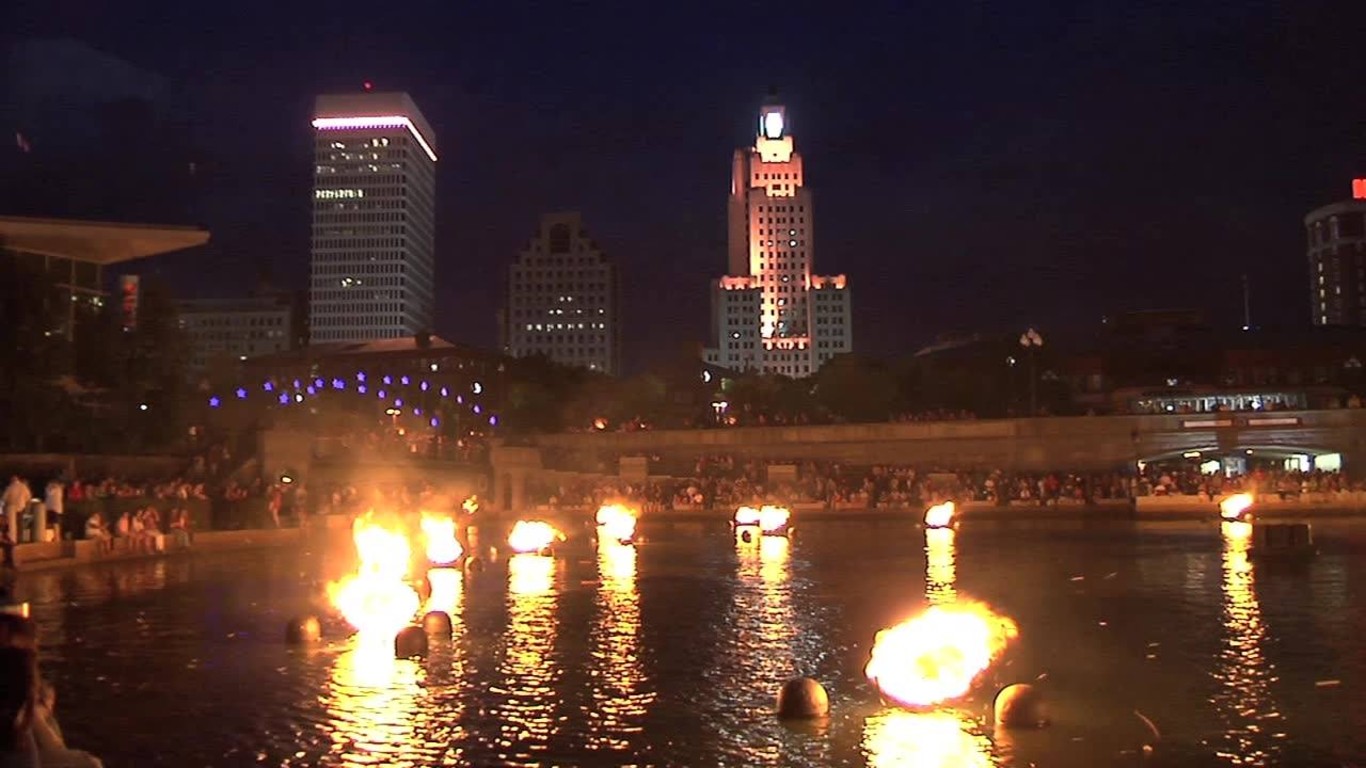
39. Rhode Island
> Tradition: Bonfires as torchlight vessels
> When: Every summer
Setting the Providence River on fire is a popular tradition in Rhode Island. In the summer, starting in late May, people at WaterFire Providence, an arts center, send more than 80 bonfires, which are basically torchlit vessels, down the river. The art exhibition was first created by Barnaby Evans in 1994.
[in-text-ad-2]
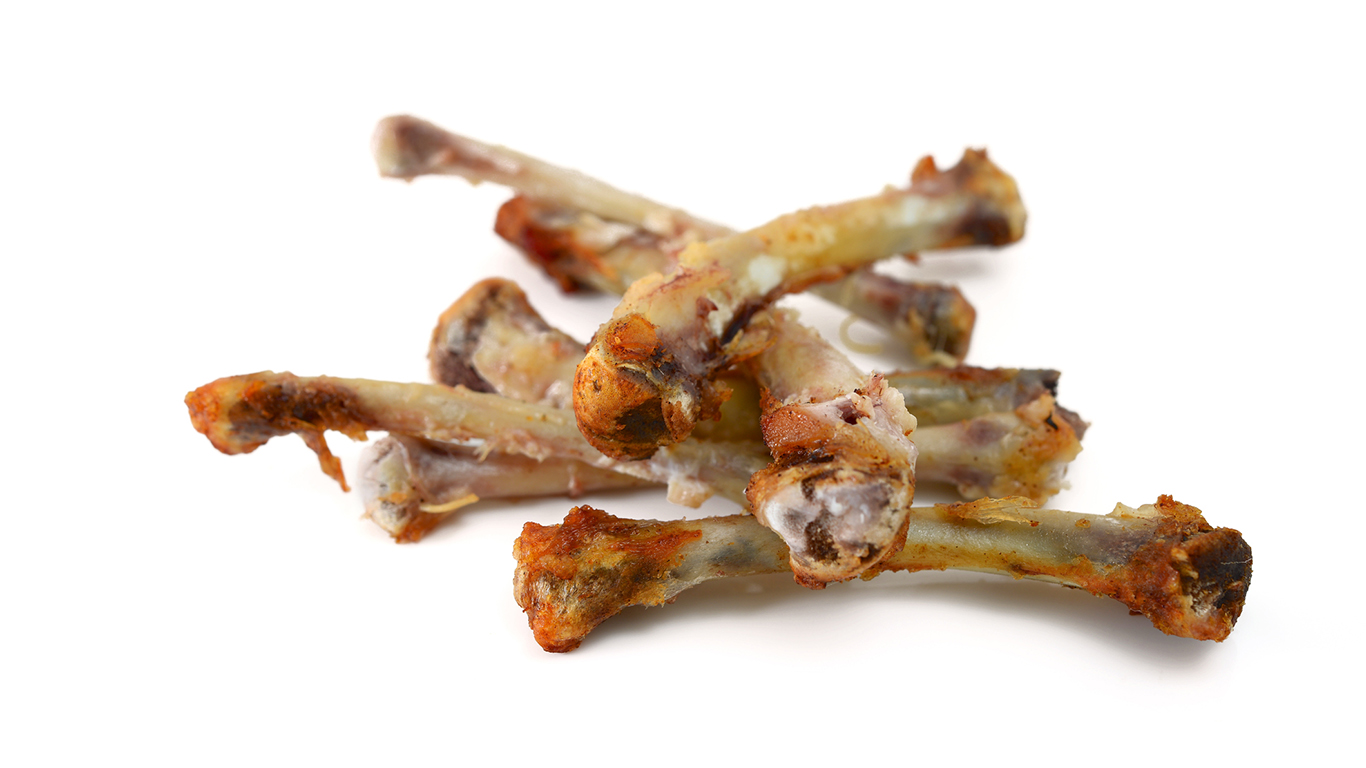
40. South Carolina
> Tradition: Rubbing bone on warts
> When: Full moon
In South Carolina, people have an interesting remedy for warts. They believe that if you rub a chicken bone on warts and then bury the bone during a full moon, the warts will be gone by the next full moon.
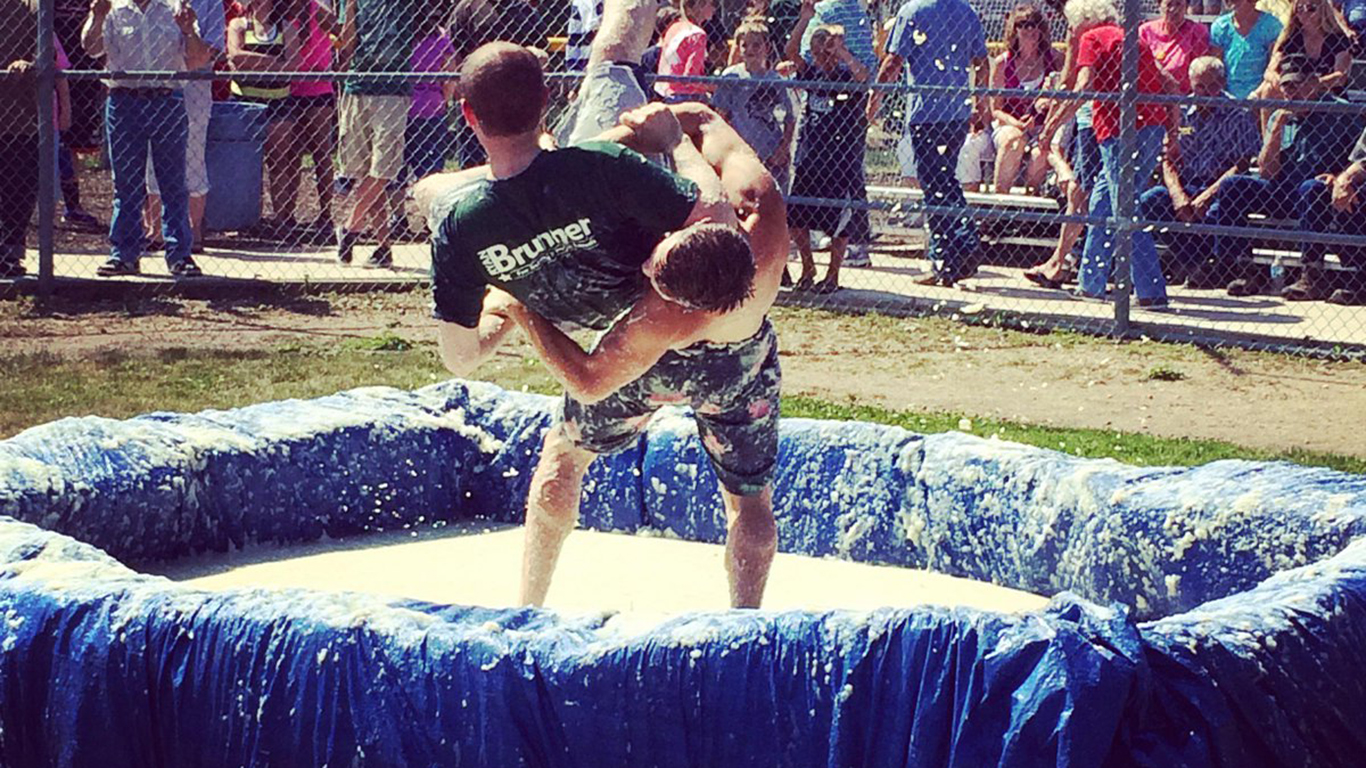
41. South Dakota
> Tradition: Mashed Potato Wrestling Contest
> When: Early August
Since 1997, Clark, South Dakota, has played host to Potato Day each August. One of the highlights of the event is the mashed potato wrestling contest, held in a large pit filled with …. mashed potatoes.
[in-text-ad]
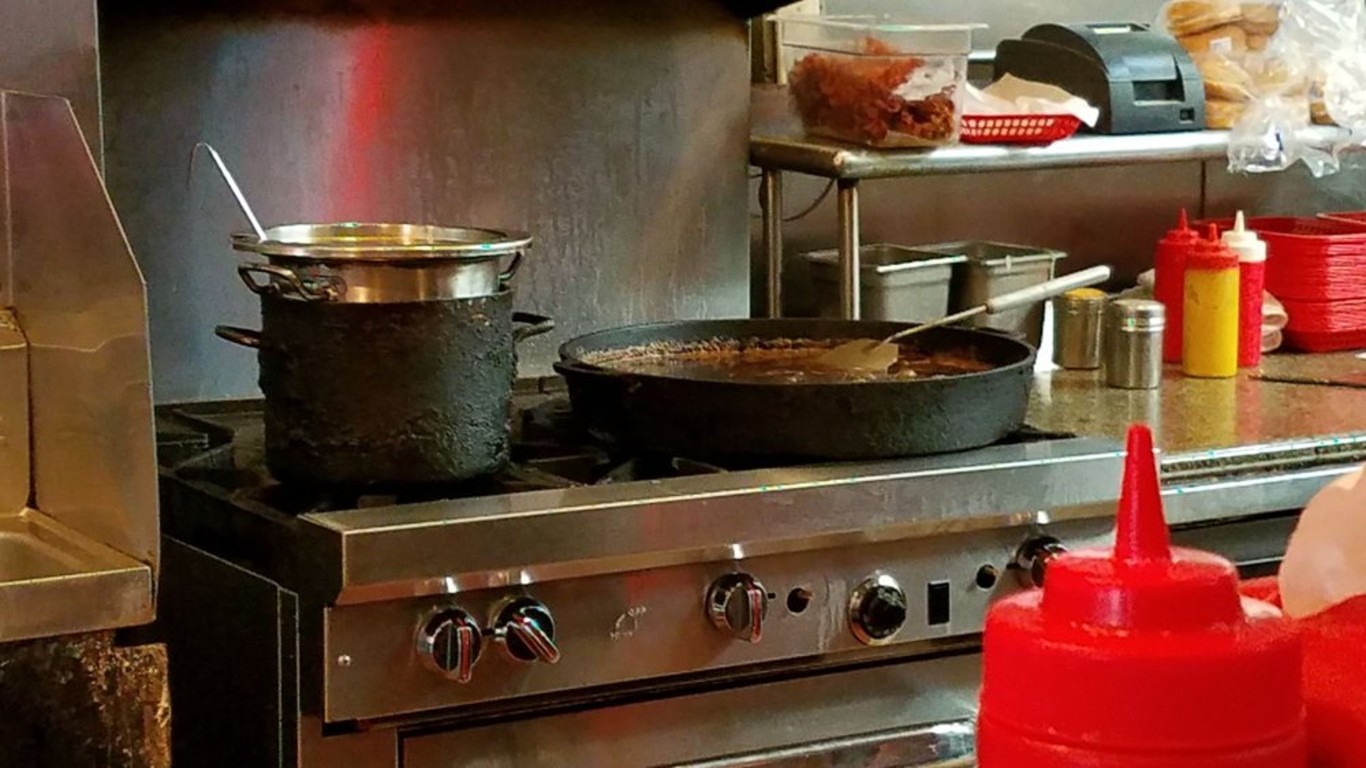
42. Tennessee
> Tradition: Cooking in century-old grease
> When: Ongoing
There is one place in Memphis — Dyer’s Burgers — that has been using the same grease since 1912, when the spot first opened, to fry its burgers. The grease is strained every day and is presumably safe. After all, people have enjoyed the burgers for more than a century.
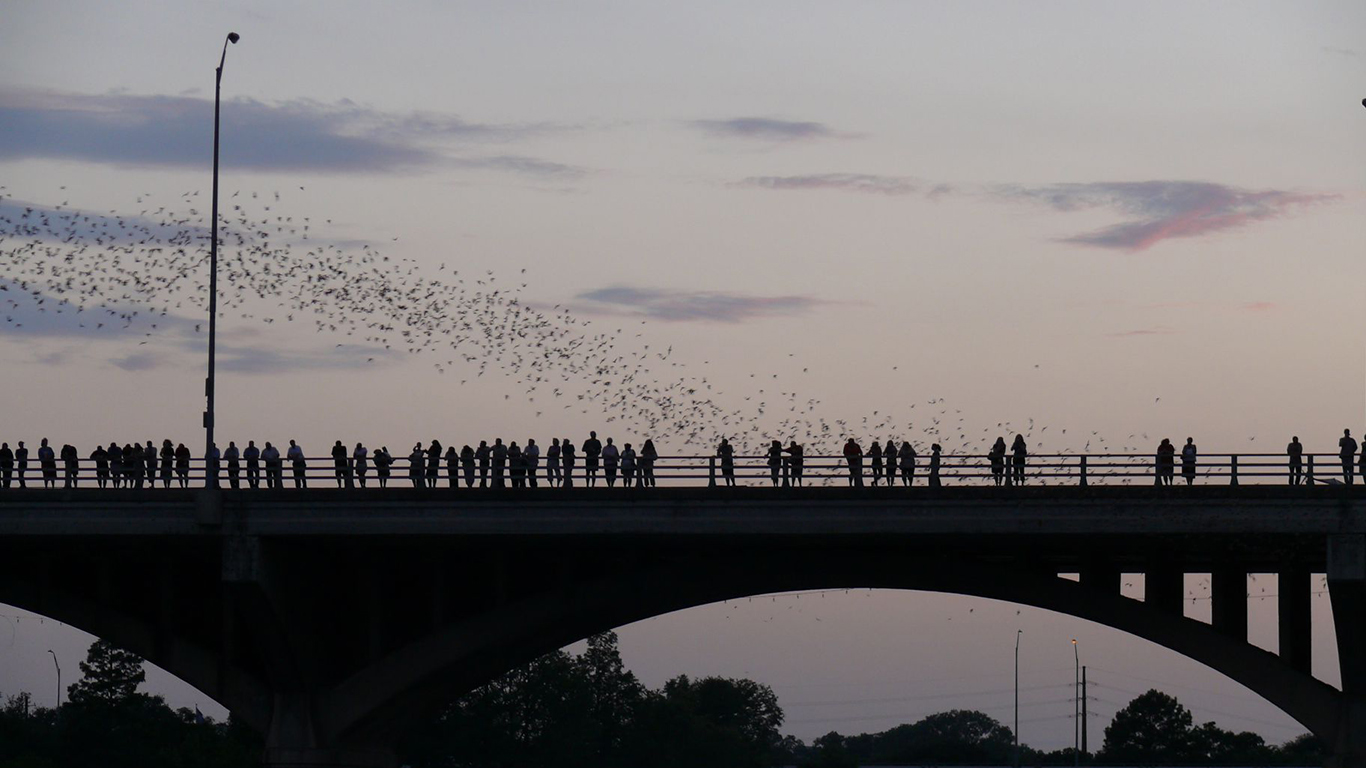
43. Texas
> Tradition: Massive bat takeoff
> When: Mid-August
Around mid-August, about 1.5 million bats that had been roosting underneath the Ann W. Richards Congress Avenue Bridge take off at dusk each night. Bat pups are born in June and are nursed by their mothers until mid-August, when they are ready to fly off. The bridge is the largest bat colony in the world and became attractive to the winged creatures following a redesign in 1980 that created more crevices for them to roost.
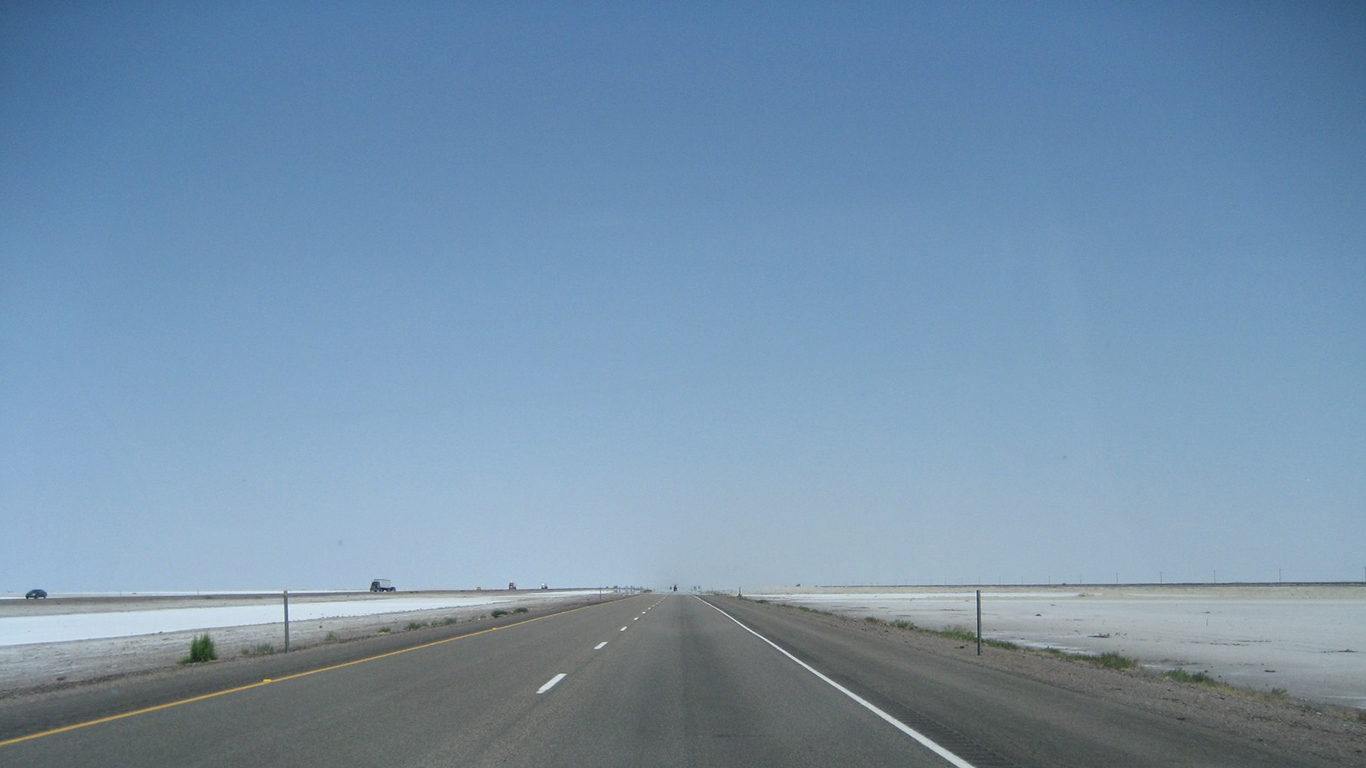
44. Utah
> Tradition: Leaving love notes in the desert
> When: Any time
Utahns like to show their affection for loved ones by putting notes in the sand along Route 80. Notes can be written into the dirt or formed with rocks. Using the landscape to communicate is a western tradition. People craft giant capital letters by painting stones on hillsides near cities.
[in-text-ad-2]
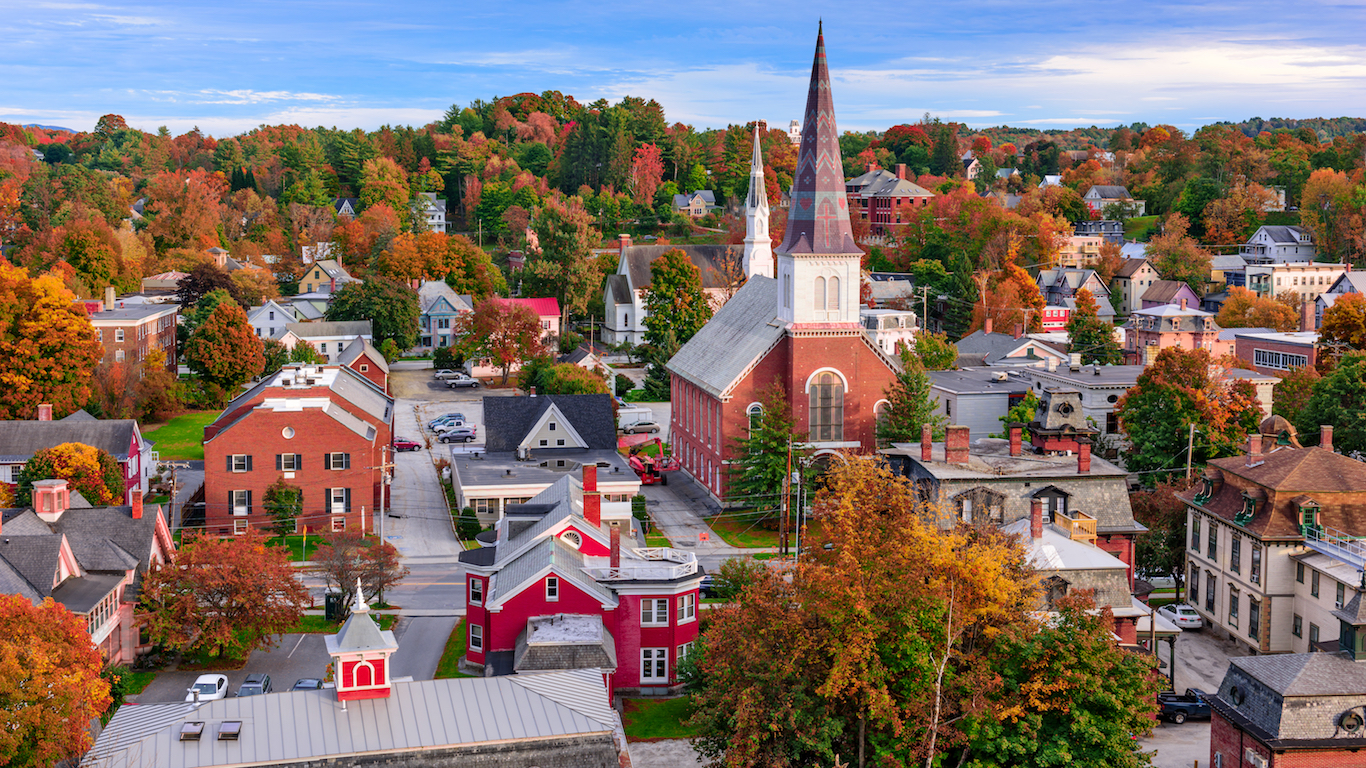
45. Vermont
> Tradition: Naked Bike Ride
> When: June 9
Vermont, which has been more tolerant of public nudity than other states, has hosted several naked bike rides. A significant one is Montpelier’s observance of World Naked Bike Ride that is held toward the end of spring. The ride, which has been held since 2007, starts at the Freeride Bike Co-op and goes through the center of Vermont’s capital.
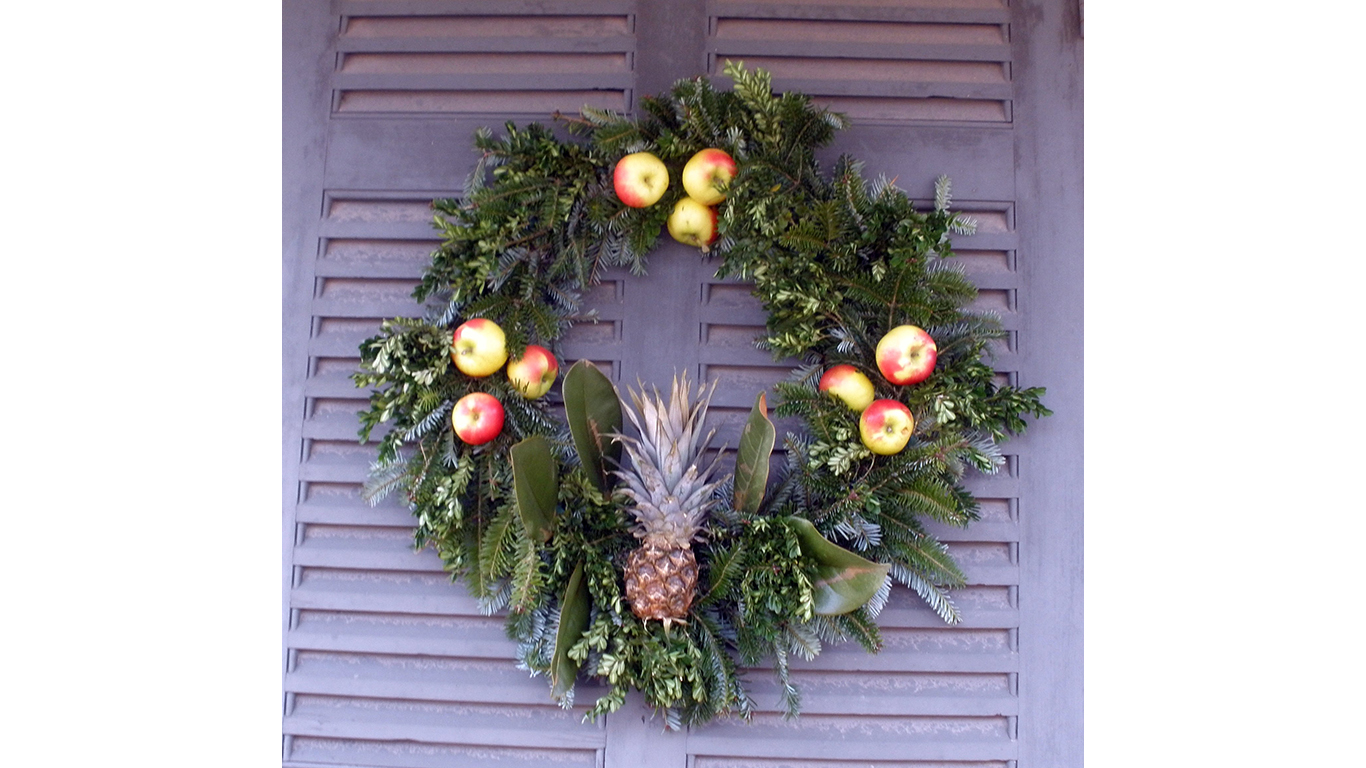
46. Virginia
> Tradition: Pineapples in Christmas wreaths
> When: Christmas season
You may not think of pineapples as a part of a Christmas wreath, but in Virginia, especially in Williamsburg, the fruit is in embedded in the holiday decoration. Pineapples are found in colonial architecture in the Virginia area and have been part of its culture since at least the mid-17th century.
[in-text-ad]
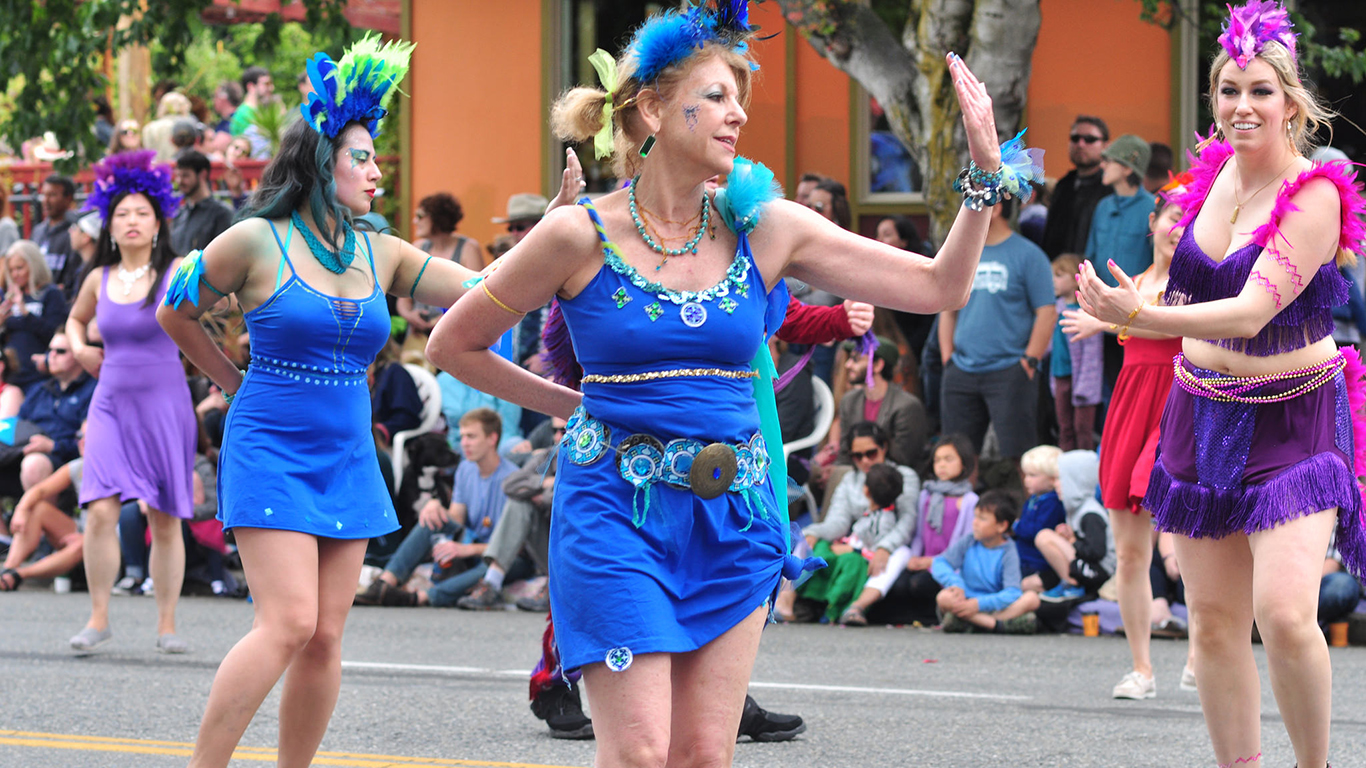
47. Washington
> Tradition: Fremont Solstice Parade
> When: June 16
The longest day of the year is cause for a parade in Seattle’s funky Fremont neighborhood. The parade features public theater, stilt walkers, bicyclists, and dancers. Anyone can participate as long as they are conveyed by a motorized vehicle and don’t display any logos. The parade’s website says the event is “a kaleidoscope of joyous human expressions.”
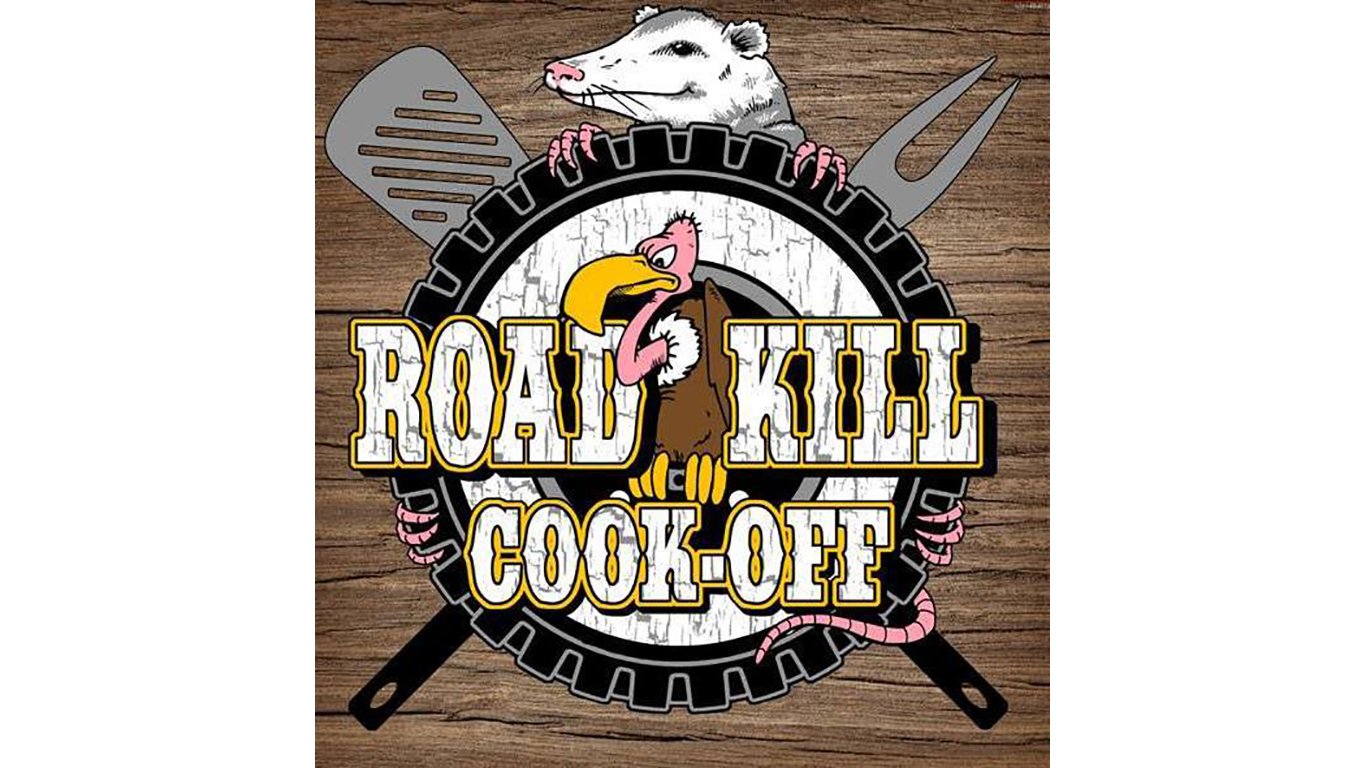
48. West Virginia
> Tradition: Roadkill Cook-off
> When: Early September
Every September, Marlington, West Virginia, plays host to the roadkill cook-off. People can sample the culinary splendor of squirrel gravy and deer sausage, foods derived from the animals that met an untimely end along the highways of the state. In previous years, the cook-off has been shown on the Food Network, the Travel Channel, and the Discovery Channel.
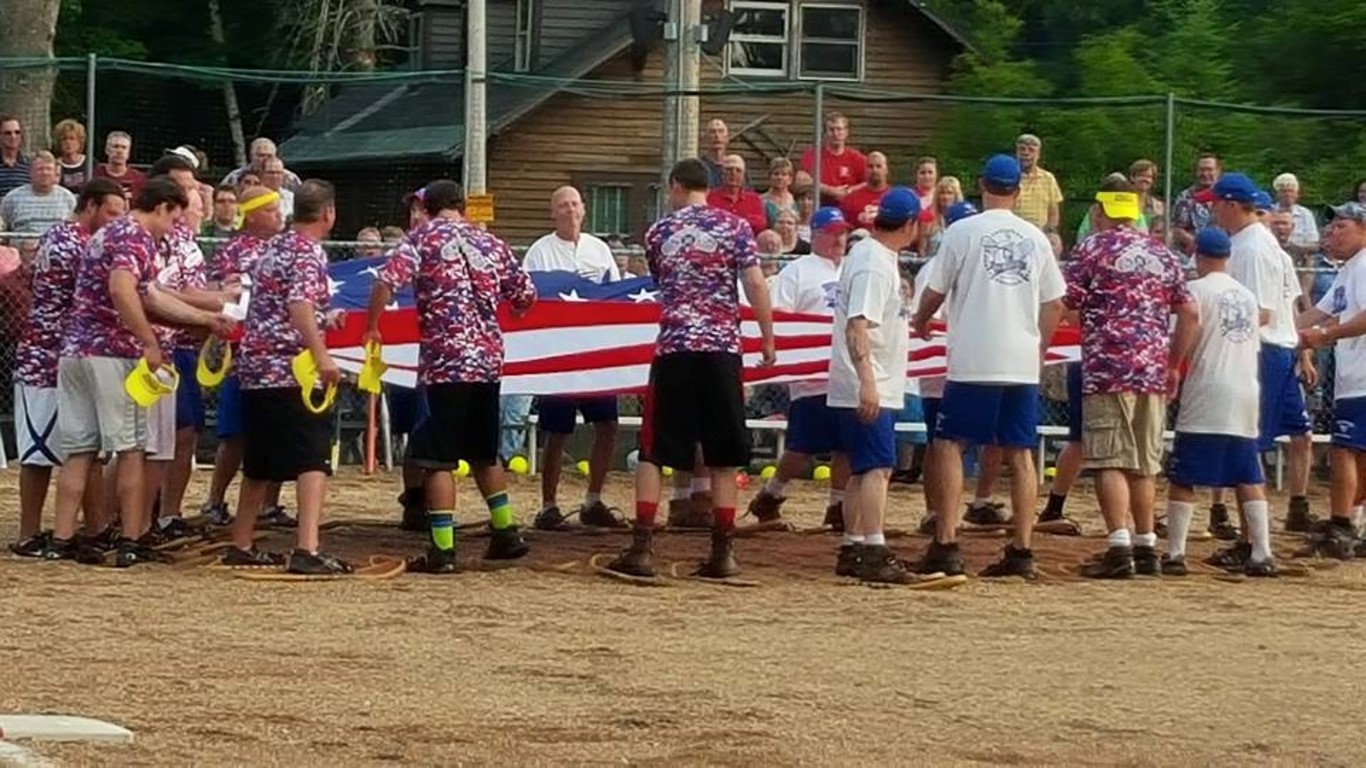
49. Wisconsin
> Tradition: Snowshoe baseball
> When: June-August
Who needs regular baseball in the summer when you can cover the field with so much saw chips that you need snowshoes to run? The tourist town of Lake Tomahawk is the proud home of the games, which take place between June and August every year.
[in-text-ad-2]
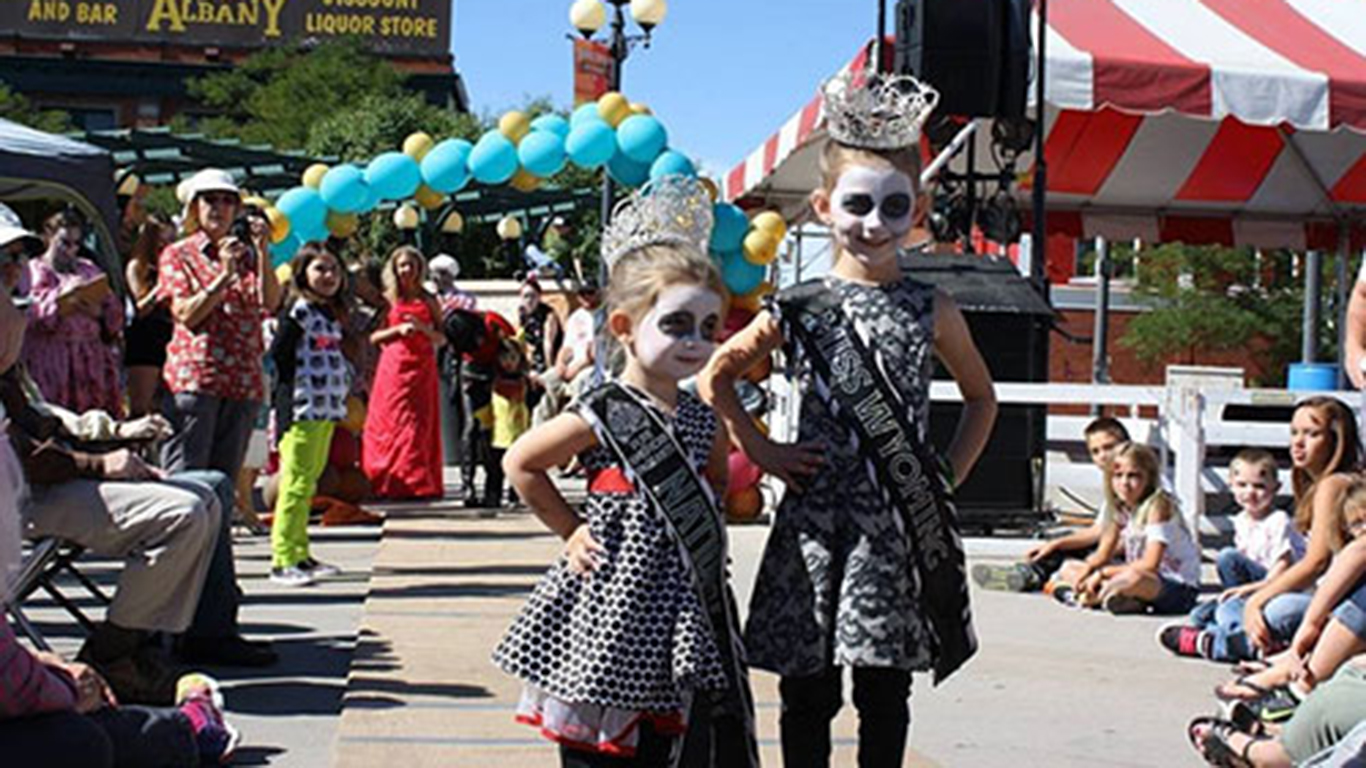
50. Wyoming
> Tradition: Cheyenne Zombiefest
> When: Sept. 15
It might not be the zombie apocalypse, but the Zombiefest is a big deal in Cheyenne, as the undead take over downtown. Features of the annual event include an undead fashion show, a zombie prom, and a walking ghost tour of downtown Cheyenne. Proceeds from Cheyenne’s traditional event go to the Cheyenne Little Theatre.
The Average American Has No Idea How Much Money You Can Make Today (Sponsor)
The last few years made people forget how much banks and CD’s can pay. Meanwhile, interest rates have spiked and many can afford to pay you much more, but most are keeping yields low and hoping you won’t notice.
But there is good news. To win qualified customers, some accounts are paying almost 10x the national average! That’s an incredible way to keep your money safe and earn more at the same time. Our top pick for high yield savings accounts includes other benefits as well. You can earn up to 3.80% with a Checking & Savings Account today Sign up and get up to $300 with direct deposit. No account fees. FDIC Insured.
Click here to see how much more you could be earning on your savings today. It takes just a few minutes to open an account to make your money work for you.
Our top pick for high yield savings accounts includes other benefits as well. You can earn up to 4.00% with a Checking & Savings Account from Sofi. Sign up and get up to $300 with direct deposit. No account fees. FDIC Insured.
Thank you for reading! Have some feedback for us?
Contact the 24/7 Wall St. editorial team.
 24/7 Wall St.
24/7 Wall St. 24/7 Wall St.
24/7 Wall St.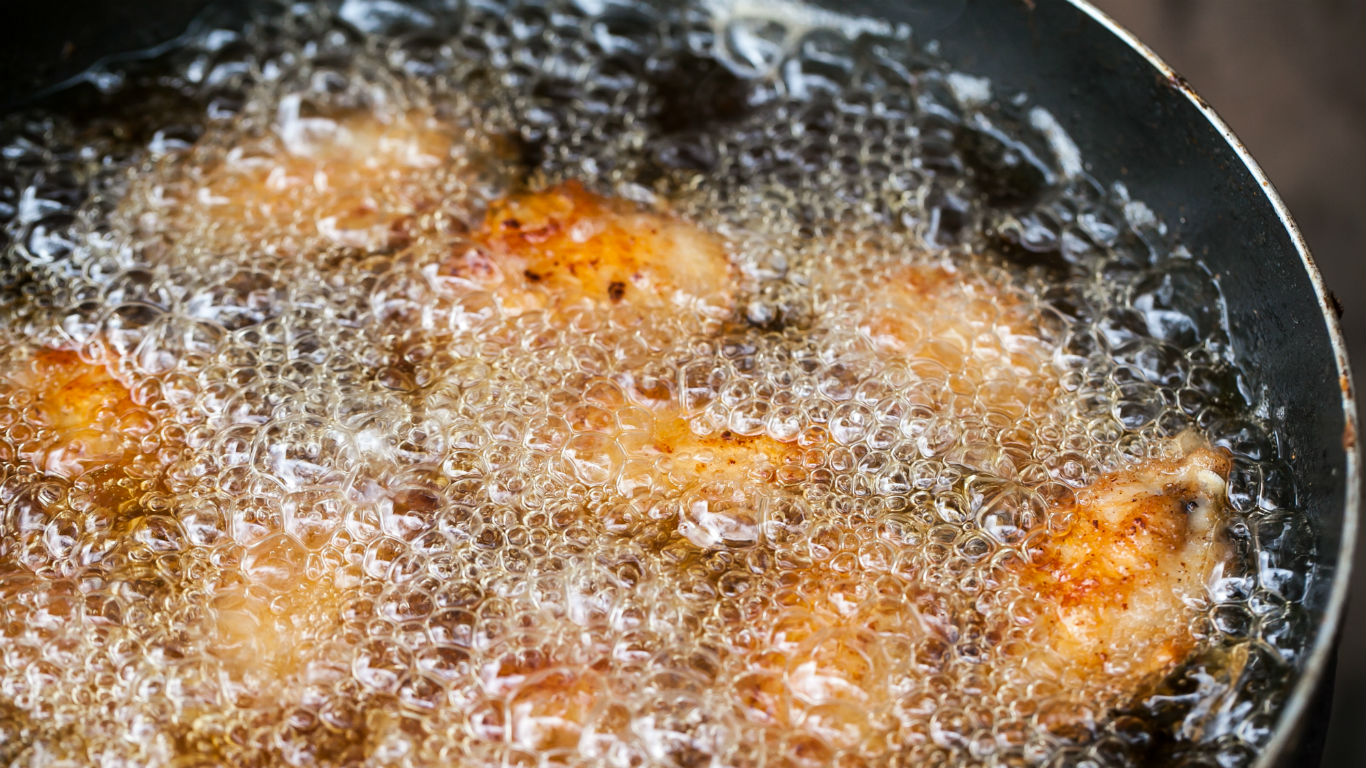 24/7 Wall St.
24/7 Wall St.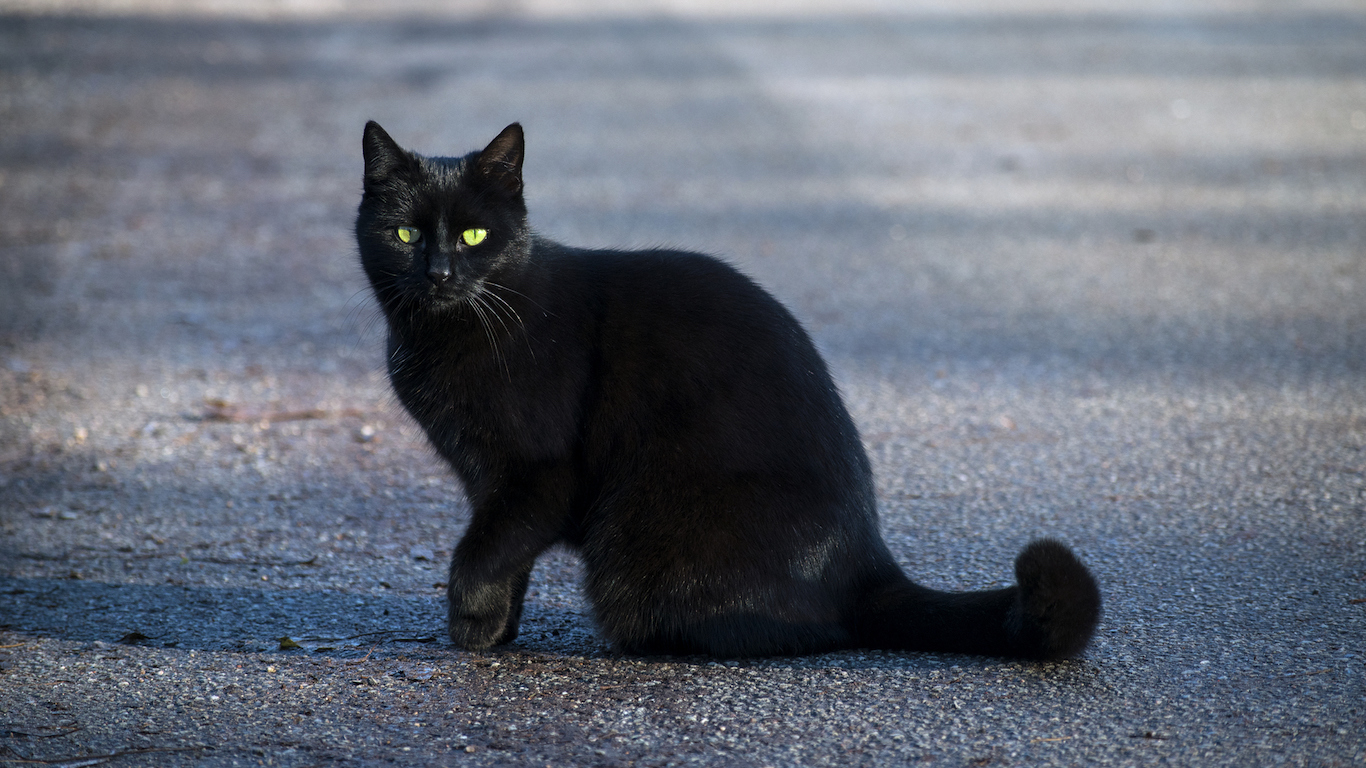 24/7 Wall St.
24/7 Wall St. 24/7 Wall St.
24/7 Wall St.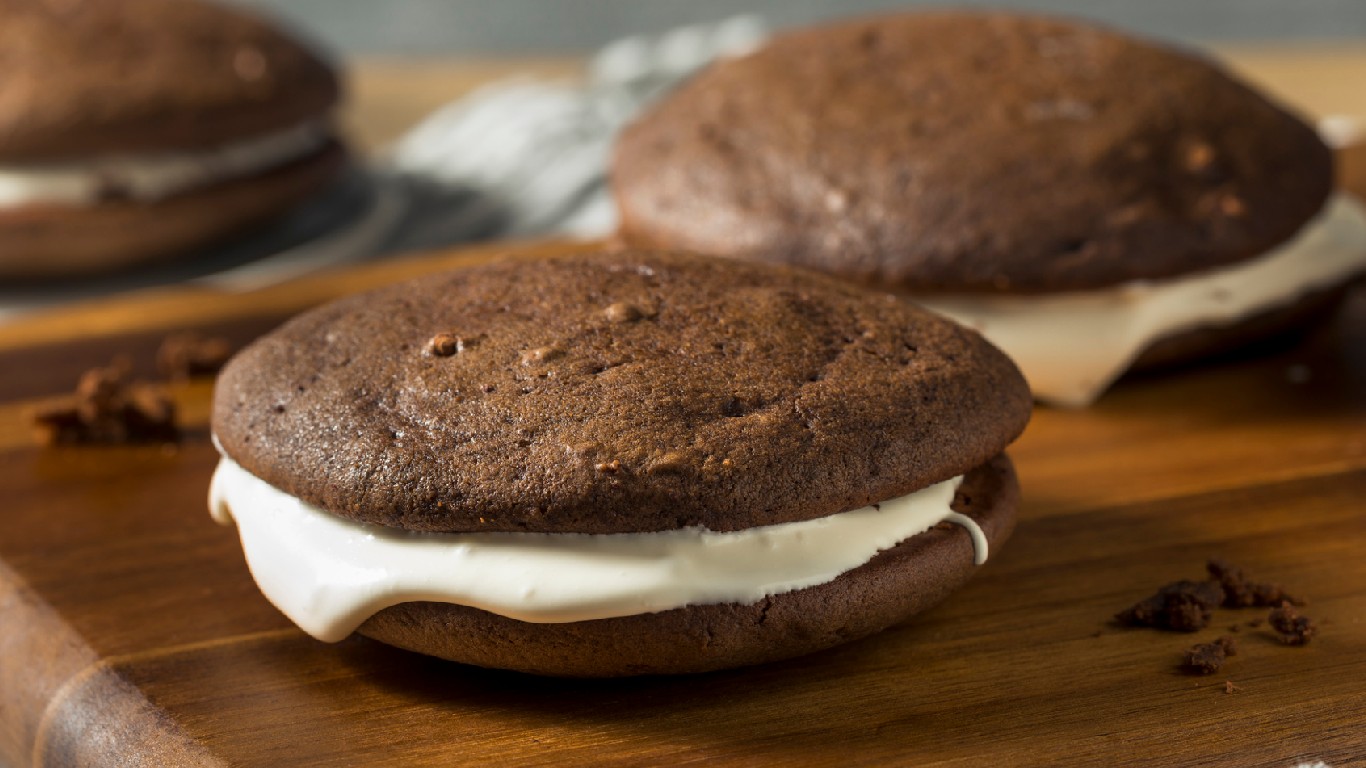 24/7 Wall St.
24/7 Wall St. 24/7 Wall St.
24/7 Wall St.
